#jungian shadow: the anime
Text
one thing that strikes me about mob psycho 100 is how closely it hews to shigeo's direct emotional experience. depending on your tastes in worldbuilding and characterization, this can either be a strength... or a weakness.
the only characters fleshed out somewhat are those shigeo is truly close to; almost everyone else is painted with just enough detail to make them feel like people. but not much more... not unlike real-life acquaintances. this rings mostly true for events in the story, too. MP100 also shines very little light on what strangers think of its protagonist, in part because he doesn't notice or care all that much.
and even those people who matter most to him? shigeo doesn't really ask about anyone's inner lives, so we only get to know others at a 'surface' level. what's ON that surface is still rich AF, but it's mostly free of backstory: we get impressionistic flashes of who reigen, and dimple, and ritsu, and teru are almost entirely from what their lives are like in the present. as a result, the story is a very autistic (and for me, relatable) headspace to walk around in.
the mutual bond ritsu and shigeo share would not feel as strong without ONE letting us rummage around inside the younger kageyama brother's head for a bit, of course. shigeo loves his little brother more than anyone else in the world, but he isn't even privy to ritsu's emotional landscape until ritsu lashes out at him in an alley one day.
and we wear reigen's skin the longest, apart from shigeo's, because the boy spends most of his free time at spirits and such. but who was he before shigeo shyly opened his office door in search of empathy? surely he was more than a bored salesman everydude looking for something to give his life meaning, but this is all that we are shown clearly. unfortunately reigen's inner life is terra incognita to shigeo: he doesn't share it with the boy and shigeo doesn't even begin to ask until the story is nearly over.
shigeo in turn shares so little of his inner life with reigen that the man isn't even aware the child has friends his own age. and his immense, map-redrawing destructive capabilities frighten reigen all the more because shigeo never fully trusted him with that knowledge. the wrath of shigeo's shadow self is as ruinous as it is because shigeo couldn't trust anyone with his emotional insides, either.
how well do we really know those we love? how well can we know them?
how well can we know anyone?
#mob psycho 100#mp100#mp100 meta#shigeo kageyama#mob psycho#characterization#worldbuilding#storytelling#storytelling by implication#relatable#jungian shadow: the anime#good stories#by autistic i mean#i have to remind myself to ask about people's feelings sometimes#autistic folks i've known and dated just. don't. ask. unless i ask them to#i think the expectation is that we'll just speak our minds regardless#but i like to know my insides are welcome before i share#idk#it made sense to me#i just ask if i can share now#kageyama shigeo#分析
80 notes
·
View notes
Text
So over the past week or so I've positively binged Shadows House
Because that anime, I swear, was made in a lab for me specifically
It's got middle-grade horror vibes and cute kids in frilly Victorian outfits and mysteries and Jungian symbolism and Doomed Gothic Lesbians and gribbly Henry Selick-ass monster designs and some of the most realistic cult dynamics I've ever seen in fiction
talk to me about shadows house PLEASE
155 notes
·
View notes
Text
The Bad Batch theory "Into the Breach"
Nala Se told Emerie Karr in her cell that she has tried to help the children, but clearly she can't. She's not trusted by Dr. Hemlock (and likely never was).
But Nala was gently pushing Emerie to realize that she IS trusted by Dr. Hemlock. Emerie is his pet, his docile and tame dog, or so he believes her to be. And his continued belief in her docility will be her weapon. Emerie is used to thinking she's powerless, but Nala Se is telling her she's NOT.
To "step into the breach" means to fill the gap in battle or task when the original person can no longer do it.
Emerie will step into the breach left open by Nala Se. According to Dr. Hemlock, Emerie will have control not just of the vaults to Project Necromancer but the subterranean levels.
Guess what's down there?
The Zillo beast, and it's power to eat electricity and grow.
And who can tame a Zillo beast? I there there's one little sister artificially imbued with the Force, and good with animals that might be up to the task.
Emerie Karr has always been Omega's Jungian Shadow. The Shadow is what we fear or hate in ourselves, and such a character, especially in traditionally masculine tales, shows the Shadow to be base, lascivious, angry, or prideful, but for Omega, her Shadow is a figure of extreme docility, something Omega fears to be. Omega has already faced her Shadow, but this story is doing something interesting.
One part of the Heroine's Journey is healing the Mother/Daughter split. I think it's possible that Omega's Shadow, that other part of herself, the docile, obedient girl she could have been is the one to heal the split. Because it was the Creatrix, Nala Se, that made this separation between sisters, that in part, allowed a Shadow to form.
The overly docile, obedient, powerless young woman faced her mother and said, "I want to help these children, but look at me, you tossed me aside left me to a horrible man, I cannot help myself, how can I help other children."
And the mother is saying, "Are you really powerless? Your docility need not be real, it is a power now, let it be a fine deception [and Nala Se has always been a bold liar, she understands deception]. Use his idea of you, your new access to his vile chambers, against him."
And I think Nala Se IS changing. Yes, she's always loved just Omega, poured everything into Omega, and kept all other children at a professional distance. But I think she wants to change. To expand her love beyond what was her focal point, her golden child.
Why is it so important that the children ask for HOME? Because for the first time, Nala Se is thinking of children as having mothers and fathers too. And SHE is a mother. Always has been. And she hurt other children to save her own daughter. It's a common, understandable action in our world--people will save their own children before another. But it's still terrible, and children shouldn't be hurt whether they have parents or not.
And Emerie's accusation that Nala abandoned her must highlight to Nala, these clones ARE her children, whether she recognizes them or not. They exist in part because of her. Nala Se likely believed Emerie, and all the other modified clones didn't need parents. But as we see with Emerie, this isn't true. Emerie needed her, or needed SOMEBODY who could be family. The multitude of clone brothers had each other as family, older and younger brothers all around. Emerie had none of them.
Nala Se can love Emerie, and show Emerie that she is worthy and capable of love beyond what she can do. And paradoxically, it may be that Emerie, the girl Nala Se gave away, is more her daughter than Omega, the child she held fast to her as an extension of herself for so many years.
52 notes
·
View notes
Text
after watching Smough's video about Miquella, i'd like to supplement the video with a bit of my own take based on it, as well as personal findings:
-St. Trina and Miquella may have shared one body because of having been born of a single-bodied Rebis/God. this is an ability only demonstrated by Marika and not even Malenia seems to demonstrate this.. perhaps because her curse to Rot is the reason for her lack of personal identity; she does not have an identity to project other than what she is, due to her affliction. in the current age, all she has been doing is dreaming(*) and awakens promptly when we arrive; likely to the only movement of air she's felt in ages
-with mention of Tarnished Archaeologist's detail about Michaelangelo's diagram of the human, you see that that can then be placed into a five pointed star. i believe it lends at least some creedence to its relation to the image i had shared; the inverted star symbolizing a horned goat, or oftentimes Baphomet- likely a signal of Messmer's presence as something *inherent* to the Golden Order; without the current Elden Ring there would be no Order but the current Order hides a serpent at the Central Intersection, which seems to represent Messmer. Baphomet was/is a pagan cult deity who represents balance and neutrality, and is almost always depicted doing a gesture signifying "as above; so below"; he is even labeled as half-human, half-animal, male and female, good and evil. he is referred to as a man but is essentially every binary set in balance; even seen as both a deity and a demon.
Literally anything not set into a binary in Elden Ring *confounds and terrifies* followers of the Golden Order. it in fact worries Corhyn so deeply that he refuses to believe Goldmask as he grovels in the ashes of the Erdtree; honestly, he looks like he's about to go mad. one of the biggest revelations in the entire game is premised around breaking a binary that was never proven to be binary at all.
in other words, the entire Golden Order is based in dichotomies and binaries, and there is a fundamental flaw in that regard, because it disregards the individual and non-binary aspects of The World to force them into a simple mold that was going to fall with time anyway
like with Gwyn's plight in dark souls, it was never about the people, it was about preventing a coming age and clinging onto whatever control, by preserving the current one forever.
As i've stated many times before, I think Miquella is the physical body and the original entity of Faith while St. Trina is a Lunar Reflection (the Albedo, or an Animus in Jungian Psych) and the hero and protector of the people she often envisions herself as. Messmer residing in the shadow realm represents a deep seated truth within miquella- a sort of "cognitive rubedo" if you will or a "truth of the mind" that he hates as much as others fear and that nobody wants found. part of this truth is marika's fault but has left miquella with a personal guilt that has torn at him so badly that eventually, a shadow of himself tore away and became its own monster from within. with the shadow realm being physically separated from the lands between, it is likely that they are a cognitive realm of marika's, of sorts, as well now.
Marika herself had this shadow hidden away, and this presents rather well because we know that there was a long period after the night of black knives that marika was still active and likely becoming more distraught. on top of this, it is within Jungian psychology that one's anima and animus come to them in dreams.it is also true that a shadow persona is borne of a conflict tearing at one's conscious until it becomes its own entity.
#elden ring#lore#shadow of the erdtree#alchemy#alchemist#messmer#miquella#malenia#miquella the unalloyed#malenia blade of miquella#messmer the impaler#as above so below
20 notes
·
View notes
Text
Lelouch vi Britannia, the Prometheus of Japanese animation
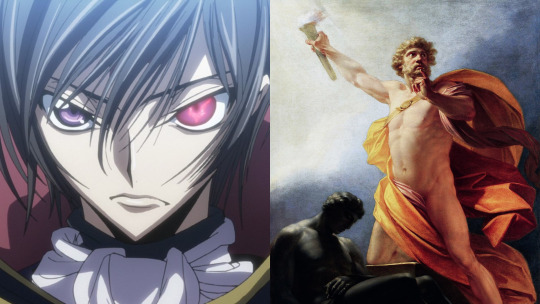
Today I want to upload an analysis about Lelouch that I had saved for a long time. This analysis is very special to me because it was a university essay (I wrote it in 2021 and it was a way to reconnect with this series since I didn't want to know anything about it after I was destroyed by the canon ending, I was disappointed by the alternative universe and the fandom disgusted me). I got a good grade, but it wasn't the best and it made me very sad because I worked hard and wrote that essay with a lot of love.
Anyway, the professor was terrible and I hated with every cell of my being every one of her classes and her way of teaching (some people shouldn't be teachers), so I don't care that I gave her a spoiler for one of the best endings from the television (maybe some of you will say that she didn't give me a higher grade because of the prejudice against Japanese animation and that could be, although it would be ironic because she said that it was allowed to choose anime characters as long as we explained to her everything with luxury detail and that's what I did.)
The essay exercise consisted of choosing a fictional character and explaining what archetype it was based on. What is an archetype? They are expressions of the collective unconscious or psychic elaborations that are part of the universal common language and that help in the composition of stories. In Jungian terms, Lelouch is a "Trickster" that mythologist Campbell defines as characters who violate the principles of the natural order, destroy life as we know it and restore it as a new dynamic. Lelouch also fits the Shadow archetype with respect to Suzaku, who is the Hero archetype, since Lelouch, in a way, represents everything that he represses about himself. I decided to analyze Lelouch starting from the figure of Prometheus because I felt that I was going to do a more complete analysis within the limit of extension that I had. If you notice that I'm being a little too explanatory in some parts or I don't stop to delve into others, keep in mind that it is because the essay was directed to someone who has never seen Code Geass in her life. With that said, here we go.
"It was 2006 when one of the most important Japanese animated series in the world premiered: Code Geass: Lelouch of the Rebellion. The story is about Lelouch vi Britannia, the seventeenth prince of the Holy Empire of Britannia, who at his young age was sent to Japan as a political hostage with his sister after rebuking his father, the Emperor, for failing to protect his family during an attack that left his mother dead and his sister paralyzed and blind. The series begins ten years after the tragedy when Britannia has already colonized three quarters of the world, including Japan, which is renamed Area 11. It's then that Lelouch obtains Geass, a mystical power that will allow him to dominate the will of the others, and with it he will adopt the alter ego of Zero, a masked vigilante, and will lead a rebellion in order to find answers for the murder of his mother and to give a kind world to his sister - and, in the process, destroy the empire who repudiated him. Stories about rebellions have been told many times. In his book The Rebel Man, Albert Camus observed that man rises up against the order that oppresses him when the situation has lasted so long that it is unsustainable. But the feeling of insurrection, although it is an awareness, arises from the archetypes that serve as a guide in times of crisis for societies and establish patterns for the characters in the stories we like. That being so, what archetype do we identify in Lelouch? The one from Prometheus. In this work, we will unravel Lelouch through this archetype.
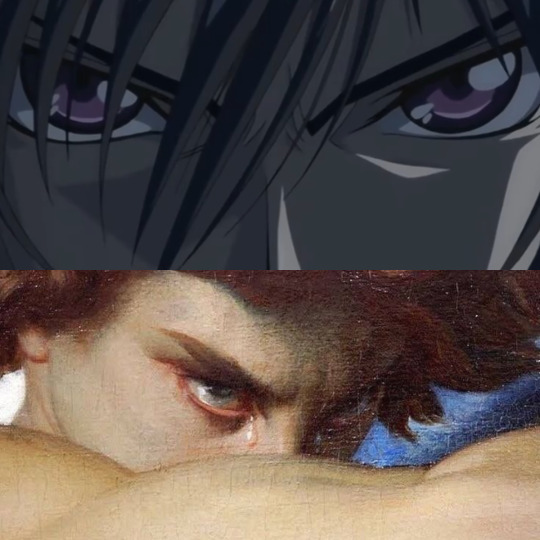
The myth of Prometheus is of vast symbolic richness. Hence it lends itself to inexhaustible reinterpretations and is one of the most reworked myths. In Prometheus: myth and tragedy, Carlos García Gual traces the different materializations of Prometheus throughout the ages and declares: "all these Prometheans (...) are united by the same resistance, the same insurrection, the same voluntary suffering" (p .194). So Prometheus transcends as a benevolent rogue who disobeys the commands of Zeus in favor of humanity, emphasizing values of rebellion and progress. However, this is far from Lelouch because, while it is true that Area 11 is under the yoke of Britannia, it is not driven by a genuine desire to free the Elevens (the colonists of Area 11), but by revenge and resentment, and it disguises its selfish reasons with intentions altruistic. He does, at least initially, as, at a turning point in the second season, Lelouch realizes that his struggle extends beyond him and his sister. He also fights for the people he loves and the humanity. In this sense, we can say that Lelouch embodies the negative expression of the archetype and this, in turn, makes him similar to another mythical figure: Lucifer. Like Lelouch, Lucifer questions the supreme power of God and incites the angels to oppose him by masking his personal motivations. When the rebellion fails, he hatches a plan to corrupt man in order to get revenge on God. And the similarities don't end there. Lelouch and Lucifer were exiled and as a result they harbor a deep hatred against their creators - in God, in the Emperor of Britannia and even in Zeus we can identify the archetype of the Father. Lelouch and Satan, additionally, are manipulators and liars. Both resort to rhetoric to get what they want from others and, like evil itself, they are seductive and charismatic. We see how Lucifer deceived Eve and how Lelouch pretends to love Rolo as his brother when he is really using him. To make it more evident, in the final stretch of the series, the other characters distinguish Lelouch as "Demon Emperor" in allusion to his evil. It may seem like we are getting off topic; however, the opposite is true. Prometheus and Lucifer are more similar than it seems at first glance. In fact, Milton's Satan drinks from Prometheus and, apart from that, emerged in the Baroque, a movement that preceded Romanticism, which had an intense affinity with Prometheus. Thus, Satan, Lelouch and Prometheus have their origin in the fact that they were part of the order that they challenge and stand out for their powerful nature. Lucifer was an angel at the service of God; Prometheus was a titan with the prophetic gift who helped Zeus during the titanomachy and Lelouch was the son of the Emperor (plus he possesses mystical power and genius intellect). And, above all, all three are essentially characterized by their cunning.
Outside of his love for the human race, Prometheus is still a scoundrel who used tricks to get his way. Hesiod presents him as a challenger to the omnipotence and omnipresence of Zeus in the Theogony, highlighting his negative traits (because his attitude is contrary to the purposes of Zeus, who wants everything good). The myth of Mecona demonstrates this since Prometheus mocked the father of the gods with malicious art with the distribution of the parts of the sacrificed bull, knowing that he would choose the most appetizing one. Here Prometheus is transgressing the sacrifice between men and gods [here I open a parenthesis to tell my readers who aren't familiar with Greek mythology nor are they mythologists that the myth of Macona is the explanation and meaning that the Greeks gave to their sacrificial rituals and if we analyze it carefully, you will see that the Prometheus' trick benefited humanity since it was established that humans could eat the meat and that the burned bones would be the sacrifice for the gods; if it had been the other way around, human would have chewed the bones as if they were dogs and the gods would have eaten the meat because that was what Zeus, who "knows what is good for man", wanted (f*ck you Zeus).] Lelouch does something similar in the eighth episode of the second season. The vicereine of Area 11 decides to restore the Administrative Zone of Japan, which is a conceptual State created with the aim of returning the rights and privileges to the Elevens that were previously denied to them as colonial powers, and establishes a dialogue with Zero (Lelouch). He accepts, on behalf of the Elevens, on the condition that "Zero" be exiled and, in this way, they close the agreement. On the day of the inauguration, Lelouch, his army and the Elevens attend the ceremony dressed as Zero, forcing Britannia to let all the Zeros go and, in turn, preventing the reduction of support for his rebel group and the Elevens are subordinated to a puppet State. This situation is one of many in which Lelouch uses his cunning to benefit the people (and his own plans).
Prometheus' other trick is the theft of fire. Against the will of Zeus, Prometheus steals the fire from the gods and gives it to men. The myth of the creation of humanity tells that Prometheus decided to give man fire to elevate him to a higher category than the animal and guarantee his survival; but what does fire symbolize in this context? David Fontana answers, in The Secret Language of Symbols, that it is "a symbol of the wisdom that differentiates men from gods" (p.111). Fire is the light that allows us to see through the shadows. It's the knowledge that constitutes the central axis in the progress of civilizations. And isn't knowledge what Lucifer offers to man in Genesis? Just in case you have any doubts, the etymology reveals it: Lucifer comes from Latin and is made up of lux (light) and ferre (carry). Therefore, Lucifer means "bringer of light." Several literary critics will compare Lucifer to Prometheus, among other aspects, for this. Paolo Astorgo, in his essay "The myth of Prometheus and human knowledge", points out in relation to this: "[Prometheus] favors humanity by providing it with certain means by which it not only systematizes its activities more quickly (... ), but it creates the first ideas about technology” (para. 5). With fire, man can create weapons and instruments. For this reason, Astorgo talks about technological advancement and this brings us back to Code Geass. In the preamble to the first episode they explain to us that Britannia conquered Japan (and many other nations) because they had "Knightmares" at their disposal, which are large armed robots. No matter how hard the Japanese tried to get their land back, they were always outmatched. It's Lelouch who obtains several Knightmares and bestows them on the rebels. Thanks to its resources and tricks, the group establishes itself as a kind of organization that soon gains the sympathy of the people and the patronage of the Japanese plutocrats. Under Lelouch's leadership, the organization grows exponentially, becoming an army that rivals that of Britannia and, consequently, is capable of fighting for the freedom of Japan. Astorgo shows that men find themselves in the need to depend on the divinities because they have fire that they also use to subdue them. By giving them fire, Prometheus not only makes man rebel against the oppressive divinities, he also provides him with tools to free himself from them. Likewise, Lelouch provides the Elevens with the same power with which Britannia bends them to become independent. And, to this, Astorgo adds: "This almost dialectical relationship God-Humanity, revolves in the myth as a constant closely linked to the fact of necessity and rebellion, which is what regularizes all the acts of “deception” that Prometheus uses before Zeus. , to steal power, with the sole objective of providing freedom to humanity" (para. 13). Here one of the values that Prometheus represents comes into play: freedom.
Satan, Prometheus and Lelouch affirm themselves as rebels against the tyranny of the powerful, but humanity suffers the consequences. Adam and Eve are expelled from Paradise; Zeus takes fire from man and grants him a new evil, and in his obsession with revenge, Lelouch unintentionally drags down innocent lives and his loved ones. But while Lucifer is apathetic; Lelouch and Prometheus suffer. In his work "Prometheus: Human Existence in Greek Interpretation", Karl Kerényi says that the nature of this archetype pushes the Prometheans to think deviously, which brings misfortune for humanity and for themselves. He alleges: “in their devious (ankyios) way of thinking (…) they are caught in their own web (ankyie): (…). And all kinds of devious paths correspond to it, from lies and deceptions to the most ingenious inventions, whose precondition, however, is always representative of a lack in the way of existing of the clever" (p.45). This is the imperfection that Kerényi reiterates throughout the text. Even though they are "titanic", Lelouch and Prometheus are imperfect because they suffer and that pain humanizes them. From there, Kerényi stipulates that suffering is part of the human condition. Lelouch, in particular, is aware of the damage that his actions have on those close to him and the innocent and lives with remorse. An example is episode thirteen of the first season: the father of one of his love interests dies due to a landslide that he causes in a confrontation with Britannia. Lelouch never forgave himself. Of course, if there was an event whose guilt always tormented him, it was the massacre of the Administrative Zone of Japan, of which he was the indirect author. The sum of the tragedies in his life leads Lelouch towards the positive side of him as an archetype and, eventually, makes him make the decision to pay for his sins, but not before leaving behind him a kind world as he had proposed.
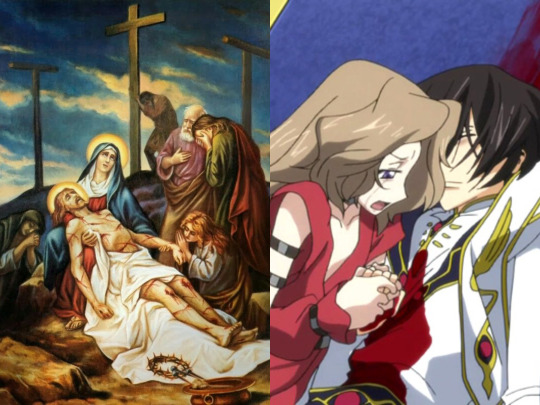
Both Prometheus and Lelouch end up succumbing to divine justice for their misdeeds. Prometheus is tied with strong chains to a rock where an eagle devours his liver and remains there for a long time until Heracles appears and shoots the animal. Lelouch's punishment, on the other hand, takes the form of the Zero Requiem; which is a plan that he develops with Suzaku, his best friend, with the aim of ending all wars and ushering in an era of peace and, in unison, answering for their crimes. After killing the Emperor and usurping the throne, Lelouch quells the insurrections against him, imposes a cruel dictatorship and establishes himself as the enemy of the world by kidnapping the leaders of the United Nations Federation (a coalition of states equivalent to the ONU), which forces the world to confront him, giving way to a war that culminates in Lelouch's victory. During the public execution of the fallen, Suzaku, dressed as Zero, appears and kills Lelouch. With his death, Lelouch accepts his punishment and takes all the hatred with him, leaving a peaceful world. Kerényi stops to analyze the tetralogy of tragedies dedicated to Prometheus by Aeschylus and observes that the cunning titan's hardships will not cease until a divinity takes charge, since Prometheus' suffering is inherent to existence. In such circumstances one could speak of a "redemption." Who replaces Prometheus is Chiron, since longed to die after being wounded by a poisoned arrow. In Lelouch's case it is Suzaku. Suzaku is a knight in the service of Britannia. Like Lelouch, he aspires to a better world, only he doesn't believe a rebellion is the key. In him we recognize, as in Heracles, the archetype of the hero. And he, like Chiron, wanted to die. However, in the end, Lelouch, who longed to live with his sister, is the one who dies and he, who wanted to die in order to purge his guilt, is the one who lives at the cost of giving up his own happiness for the good of humanity by existing. just like Zero. Thus, the two friends atone for his sins and Lelouch, who proclaimed himself as the Messiah, achieves his redemption by becoming what he preached so much (although a few know that). There is no doubt that this sacrifice for love of humanity makes us think of Jesus Christ.
Literary critics also often compare him to Prometheus and, by extension, we could compare him to Lelouch. The three are united by their closeness to men, for whom they endure a via crucis and the three are saviors of humanity. And this brings us back to Joseph Campbell's words about the definition of "hero." In simple terms, a hero is one who gives his life for something greater than himself or different from him. It is likely that there will be those who resist considering Christ as a hero. Lelouch, for his part, certainly falls within the category of tragic hero. Regarding Prometheus, García Gual attributes his heroic character to Aeschylus stating that it was his work that immortalized in tragedy for posterity the myth of an old trickster.
Either way, Lelouch is an excellent example that archetypes are rooted in the collective imagination and are binary, universal, and ahistorical in nature. Despite the enormous time gap and the difference between cultures, the archetypes represent the same values that they once had and are still capable of continuing to captivate us with wonderful narratives that have a lot to teach us."
And, well, that's how I concluded my essay. The truth is, I think I could have gone deeper since the approach has enough potential to develop a thesis, but I couldn't go on for five pages and the proffesor complained that some of my classmates decided to ignore the rule and, therefore, exceed the limit. It seems that she is one of those proffesors who doesn't want to read shit (did I mention that I despise her?). So I apologize for so little and I will allow you to hate me for this horrible English (I didn't put the quotes in their original language and then translate them, I know, I deserve you to hate me for that too).
But, if you don't hate me and you liked my work, I invite you to give me a like. If you've never thought about what archetype Lelouch is based on, give me a like. If you found the association between Jesus Christ, Satan, Prometheus and Lelouch fascinating, give me a like. If my essay made you think, give me a like. If you want to make me happy or would like my humble essay to be more widely disseminated, share it. This way I will take into account that you like me to analyze Code Geass characters through archetypes and I can bring more similar content. I would like to talk soon about a part of Joseph Campbell's hero's journey in particular that is very easy to identify in Lelouch's journey (how the hell can Lelouch be an antihero, if he has the word HERO tattooed all over his forehead?). Well, there are a lot of things I want to discuss! It's just that my life and time are not enough for me to do everything I want. Anyway, have a nice night and don't forget to eat meat to piss off Zeus.
#code geass: lelouch of the rebellion#code geass#code geass: hangyaku no lelouch#lelouch#lelouch vi britannia#lelouch lamperouge#greek mythology#prometheus#archetypes
39 notes
·
View notes
Note
Hi, love your twst theories! And while I adore the idea that Meleanor's trapped inside the Magic Mirror (as she could still be alive) do you think it's possible that it's actually Levan who is trapped there - as well as being Crowley simultaneously?
When I read that OB!Malleus's voice sounds like Levan I thought that of the ones we've heard so far he sounds most like the Magic Mirror but higher or Crowley when he speaks seriously but lower. What we have seen so far is that when a person Overblots, their voice becames this multilayered cagophony (expect for Malleus). Could it be that Crowley and the entity inside the Magic Mirror are both parts of Levan and his soul has been fractured into two through Overblot, and his real voice is somewhere in the middle of the frequency of these spectrums?
It could work as a way to reference how Diablo was turned to stone (but didn't die, as in the book "Maleficent's revenge" he is able to break from his petrification) in the Sleeping Beauty. If Levan was able to trap his Shadow in the Mirror (or himself and allowing his Shadow to stay on the outside) it could be that this is why he is associated with STYX.
It would also give this sort of duality that could bridge Diablo from the og animated movie and Diaval from the live action film (both starting with "Dia", as in "ディア・クロウリーDia Kurourī"), Miyamoto-san's role as adult Simba in the Japanese dub of the Lion King, as both the Noble King of the Pride Rock and the weirdo hobo living in selfimposed exile (probably not relevant but I thought it's funny that he did not reprise the role in the sequel film in which Simba is seen in the role of the overprotective father of the Main Character Kiara, but does return for the animated show the Lion Guard, in which Simba is portrayed as a much more hands off parent) and both the upright and reversed meanings of the Magician in the Tarot deck.
It could be that Crowley doesn't even know/remember who he is, if we take in to account that in Jungian psychology Shadow represents the parts of your psyche that you wish to repress, and only by accepting it can you start to heal and solve the crisis in your identity (as has been the case for the Overblots so far) and by keeping these parts of himself separate and Levan is unable recognize and reconcile his past.
Hello!! Ahh, thank you so much, I’m happy you like my theories! \(//∇//)\ This is such an interesting ask- and a bit of a tangent haha, but I enjoy the theorist side of TWST so much because of how theories are always growing and fluctuating. One core theory can branch off and create so many different ideas, so there’s always inspiration to go around and new ideas to explore.
The idea of Levan’s Overblot breaking his soul into two is such an fascinating idea ahhh!!! \(//∇//)\ This would be an amazing way to explain all these differing aspects of him. For a long time now, I’ve been a believer of the theory that Crowley is in a very unique state of Overblot, just barely teetering over the edge while also managing to survive this long. I wouldn’t be surprised if it meant that being in a catastrophic Overblot state for centuries on end has indeed meddled with his soul in this manner.
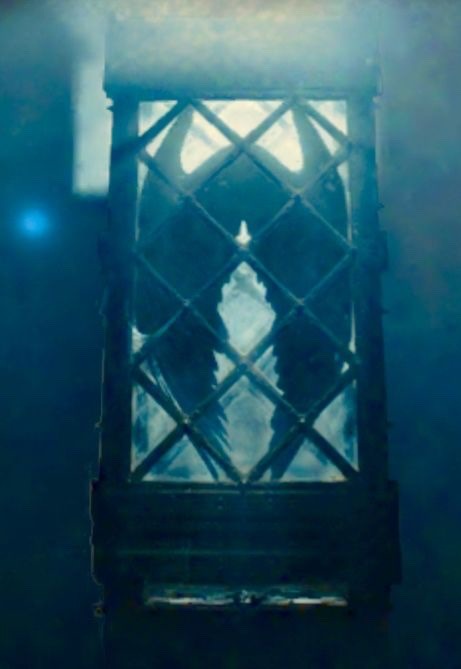
Levan being trapped in the Dark Mirror is also such a good reference to the live action Maleficent, when Maleficent’s wings are stolen. Meleanor considers Levan to be her eyes and limbs, which could also mean her wings. Maleficent’s wings are seen in this glass cage, but are still very well alive on their own. Levan being Meleanor’s wings means he could be the one trapped behind the glass of the Dark Mirror 👀 If this part of Levan is trapped, I think it could also explain how Crowley keeps referring to his “wings” as if they were a physical part of his body, while also simultaneously not seeming to have them.
It reminds me of the line in Maleficent when she says to Aurora that “I had wings once. They were strong, but then they were stolen from me.” Levan was a top general and a diplomat. He was a strong and capable man, and is rumored to have even faced the Dawn Knight himself and survived, whereas Meleanor perished. It makes me wonder that when Levan left Meleanor, Eggleus (lol), and Lilia to battle at the fort, if something akin to an Overblot happened. Parts of him being fractured and “stolen.” 🤔

I’d also like to point out that the manga specifically shows Crowley in the prologue speaking to the Dark Mirror…without his mask. His voice is the prologue is one of the very few times where his voice deepens, and has no hint of his typical flamboyant personality. Perhaps Crowley not having his mask is a representation of these fragments of his soul coming back together? :0 There’s also a very interesting TWST trailer that has Miyamoto speaking, presumably as Crowley, but his voice is deeper than we’ve ever heard Crowley’s character speak before. Perhaps this is his “true” voice as Levan, and thrus similar as Malleus? For anyone else who wants to know more about the upright/reversed tarot card for Crowley, I made a post explaining it all here! ^_^ that’s such a good point of how Crowley can be both the upright and reversed when you consider him being Levan as well!!!
Also AHHH the Jungian psychology!! 😭💖💖💖 this is such an amazing point, especially regarding the Overblots. I’d like to think that primary part of who Levan is the one trapped in the mirror, while his shadow, Crowley, is the one who exists on the outside. Overblots amplify the negative or surpressed traits of a person’s personality, to the point of nearly killing other characters from how caught up they get in their own negative emotions. Crowley is always criticized for his own ego regarding his “kindness,” of how he can be unreliable and a very fleeting presence.

Levan has been referred to as “kind” (with the same word in Japanese that Crowley uses), and Lilia claims that Levan gets constantly praised for the simplest of things that don’t really deserve it, primarily by Meleanor. I wouldn’t be surprised that through Crowley, these traits of Levan were amplified, giving Crowley an ego for things he didn’t really earn, and praising himself for his kindness. Like a remnant of how Lilia and Meleanor excessively praised him.
You make such an amazing point about how if the shadow and the person is separated, that Levan/Crowley cannot recognize and reconcile with his past!! Absjxjs I was a bit of a persona 4 fan back in the day, but it essentially feels like that, of having to confront this shadow of yourself to reconcile your misgivings. It’s the same thing in TWST, where this harsh but necessary confrontation with this darker side of themselves is what saves them from succumbing to their Overblot.
Also andjxjsbdbs the point of Miyamoto’s role as Simba!! 🤣🤣🤣🤣 It’s…quite fitting, actually! 🤣 we gotta love Levan’s self imposed exile through a weird birb man like Crowley 🫡💖
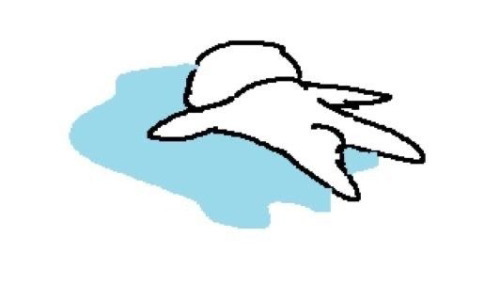
This was an amazing ask, thank you so much for putting this into my brain! 🤣💖💖💖💖🐦⬛🐦⬛🐦⬛ I adore this idea so much, and I feel like your points helped me explain some of my visions for the whole Crowley and Levan situation haha \(//∇//)\ I’d like to make fanart illustrating this idea, I just love it so much. Thank you so much for the wait in answering this ask, and for taking the time to write this! Have a good day! ^_^ 🫶🐦⬛
25 notes
·
View notes
Text
To play a part: Alastor's raison d'etre
Alastor's personality, role, and purpose
“It's the purest kind, my dear: Reality! True passion! After all, the world is a stage and the stage is a world of entertainment.”
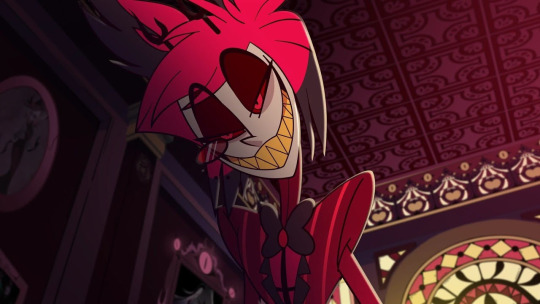
Alastor has been presented to us as an omniscient force: somehow possessing an awareness that makes us doubt ours, a stubbornness that shadows others, all while holding something to unveil. Alastor’s testament in the writer’s community shines through the controversy around his character, whether he has an altruistic nature while forbidding it, or is merely choosing to play a part in the circus Hell is, we can't say. It is because of this that I wanted to do an analysis of Alastor and look behind the veil he challenges others to look past.
On one hand, Alastor is a shadow. But if he's a shadow, who owns it? One can only become conscious of the shadow in personality by recognizing reality.
On the other hand, if the world is sheer entertainment, who will lead, who will act, and who will watch?
note: first analysis & post! hope it’s written well, considering english isn’t my native tongue.
note 2: i'll first list things i find interesting about his personality, how much of a mentor he rly is, and in the end i'll determine if he's the director, actor, or spectator. and of course his purpose of life, not for the show.
Alastor has a pathological need to exert his power.
It's not the biggest secret.
The need for control is fundamental in human experience and a drive of human nature. It is an ersatz emotion, in a way. It's a self-imposed need, not quite something to feel.
For someone like Alastor who abhors primal instincts, he’s driven by them. His instincts rule his world: he needs to have power, to rule in tyranny, to hunt, and to feel the thrill.
To represent Alastor as a Jungian Shadow or as a person with a conflicting Ego isn't too far-fetched. He is all that Charlie refuses to accept of Hell, and his own shadow betrays his face. If an inevitable force is neglected for too long, it'll fester and grow until depravity is wished for instead of what it represents. It is his id and superego that is unbalanced. His unconscious desires and his moral and social standing. To overlap is possible, and we can certainly see a fair share of unhinged and yet forcibly restrained moments of him with Charlie.
He is not good at controlling himself, he's a feral animal waiting just the right moment to pounce on his prey.
Someone who seeks to exert their control will look for someone in need of guidance. As a mentor figure, Alastor is complicated. With a regime to follow, it is he who festers on the darkness of Charlotte Morningstar and uses her need to know she matters to control her power, but it is also he who guides her to greatness and the like.
Soo...
There are many causes as to why obsession with control and power arises. Trauma, insecurity, misguided righteousness.
Positively, these kinds of people want to take charge and make an impact, seeking positions of leadership and pursuing others at their best. At their worst, they assert their power by controlling others to feel sure of themselves over how powerless they are otherwise.
But what if this need for control is (in most of situations) for attention because they need it to thrive and not uniquely for leadership because they’re insecure of their environment? it can be both, but one more than the other.
Alastor is a showman, contradicting himself in his ethics and in his phrases.
“No tacky circus decor,” when his philosophy of life is derived from entertainment and the destruction that would happen if he’s left unattended for too long. YOU are the circus alastor

In the Overlord meeting, he is left in disappointment and in ridicule as he expects attention due to his self-imposed importance. Recurringly, doubts over his power arise in the hotel thanks to his distaste for sinners and neglect towards them. He comes back after 7 years to be derided. Alastor is always caviling against authority, is this because he is the authority pushing down "rebels" in his world or wants to be it?
There are only two ways of winning this authority: 1. to destroy 2. to become
"I'm sure you've all been wondering!"

Characteristics of Alastor
aside from the obvious charm, of course!
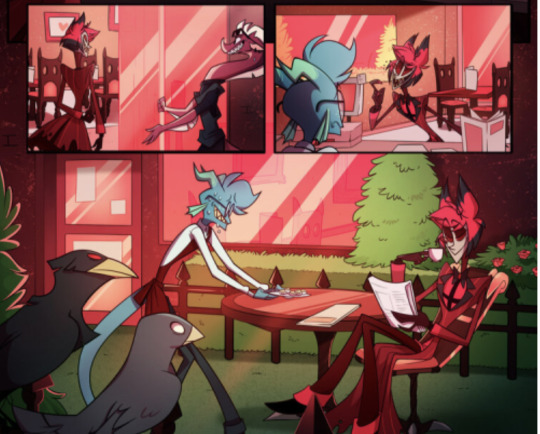
imposed belief of importance and/or of interest. It is not a deluded belief. It is something outsiders keep on giving him: the attention and thrill of being renowned. This can be seen from common sinners to Vox.
His list of priorities:
1. Alastor
2. Red fluff guy
3. Oh-Deer-Mug-Guy
4. Weird Cat Alastor
and so on.
And it's not entirely incorrect! Vox gives him so much attention, no matter if negative. While Alastor can build his radio empire thanks to Vox...
Alastor isn't entirely amused.
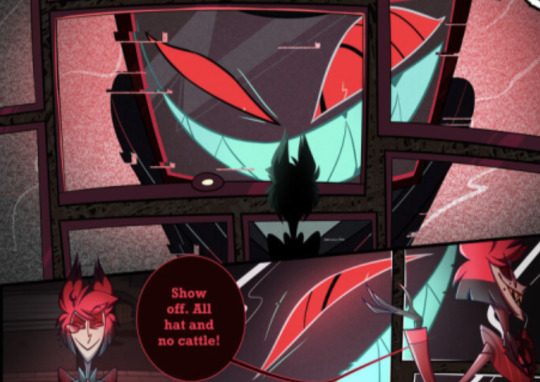
It's the annoyance.
Alastor is bemused at being threatened by others of an equal or higher rank, as seen with Lucifer as well.
Continuing...

2. this "narcissism" is assured by minions that he knows how to play like pawns.
If he cannot get his resource of attention from outsiders, he’ll get it himself with Niffty, Husker, and his weird-looking minions.
3.… all while destroying & humiliating those that are averse
See Vaggie in Alastor's reprise and in the series. See Sir Pentious and… everyone. He is a contradictory character, he pits everyone against each other so he looks amiable compared to them, and yet he can’t help but antagonize those allied with him because he sees them all as pawns that he needs to force authority over. he continuously makes the people in his surrounding environment be as unregal as they can be compared to the likes like him. He holds himself with such an air of confidence there’s no room to doubt, and there are no other doors that lead to other rooms. His only acquaintance who appears to view him as a person interested in business is Rosie, a fellow cannibalistic overlord who praises manners, amorality, and culpability.
Last thing to determine what exactly he is..
he likes dependency and thrives on it
he forces it beyond remedy and thrives in deficiency in both tastes and relationships. He also has an inherent lack of respect.

Alastor is incredibly observant, see his assumption of Charlotte's struggles with her father due to her lack of resistance and heightened trust in Alastor as an authoritarian and therefore paternal figure. He doesn't seek dependency of others, worship, because just they could be useful. He seeks this form of worship as a pathological need for attention and power aside from the efficiency. To be the most important person in the room and have someone to corrupt.
Charlie is a sheltered, young woman with childish hopes and dreams thanks to the care of the fallen angel, Lucifer and the first woman, Lilith (her sheltering mainly came from Lucifer and his inherent shame and culpability of raising Charlie in Hell while her hopes were enforced by her mother, the siren of hell).
Alastor, at his arrival, states his true intentions to Charlie:
“I want to watch the scum of the world struggle to climb up the hill of betterment only to repeatedly trip and tumble down to the fiery pit of failure!”
but quickly regains his moral high ground in his reprise of Charlie’s song, “ Inside of Every Demon is a Rainbow '' , raising a feeling of importance and awareness to the original singer. It gives the message that someone held on to that song with quite an admiration to the point of a reprise. You can assume that, but the lyrics are a whole other mess. Alastor warms Charlie up by giving her the assurance she so craves while demolishing her beliefs.
“inside of every demon is a lost cause,”
He causes discord between the other residents of the hotel, humiliating Vaggie further by slapping her in the ass, shoving her, and so on. He also takes Charlie to dance and squashes her cheeks. What a lovely boy!
…That’s what we think until we check in five days later, in Overture. Alastor is vain, so he only lets himself be tasked with a lazy chore(or a perfunctory courtesy) to gain trust and doesn’t accept any interventions from anyone, including the same person he did the chore for to manipulate. When Charlie, while praising him, interjects, Alastor isn’t convivial.
His behavior is rather ordinary for everyone in the hotel as well. He belittles all the same, making it normalized and taken as a bluff, when he is in fact lowering everyone, including Charlie, in his world-view.
Alastor is an egoist who doesn't advise acumen nor gives counsel. He has his own self-imposed self-discipline, recalcitrant and rigid all the time. That’s why he’s the perfect yet worst archetype of a mentor: he has a regime to follow and a mentor does not shape the younger counterpart into a reflection, they make the counterpart great like them. It's simple. While Alastor knows a lot of things and has his intellectuality, he's not willing to give it away for free.
And yet, he is apathetic to most of the struggles even if he can take the pathway of becoming morally helpful and increasing trust with his comrades. It simply isn’t his bother and is neglectful most of the time with those that are not superficial (while loathing the act of being superficial) and when something catches his interest, he’ll force his way in, deprecate them, and take advantage of the situation (ep2 & ep7). He’s so arrogant that it’s his flaw, so prideful that ONLY if his power is threatened, his demeanor will change and seeking attention thanks to his power will become insecure about his surroundings and a potential risk of losing the power he collected (dad beats dad). He's paranoid, prideful until something else great comes in thanks to culpability. He analyzes the situation and uses everyone's skeletons in the closets against them. He establishes his power on the defenseless so as to not lose his social standing when stressed.

It’s not that he has a great patience and tolerance... it’s that whenever he fears or feels threatened, he demonstrates it against the "vulnerable" behind scenes.
And it is in this that he finds the chance to mentor Charlie into greatness. A path into not snapping in front of Charlie and keeping his social image intact, impeccable, serving as someone to look up to for Charlie.

She’s filled with potential that I could guide
It is in episode 2, if not 1, when Alastor’s facade & pride starts to crumble as everyone questions his authority & power within and out of the hotel. he gets increasingly more stiff until "finale". but that's for another time!
So, after summing up Alastor's character in brief words,
what is he?
hypocrisy.. coming from ὑποκρίνομαι, 1. to answer 2. to interpret 3. (attic) to dialogue, to answer on the stage; to play a part, to be an actor.
He's like a chameleon, shifting between roles and motivations, often blurring the lines between mentor, antagonist, and entertainer.
He is a symbol of hypocrisy, playing different roles to suit his own desires while leaving others to question their own perceptions of reality. Whether he's an actor, a director, or simply a part of the crowd is "unknown". He's perfectly misaligned. But from what we know right now…

he's paranoid, in the end. without attention, without leading people, without any aspect of what makes him him, even the smallest things, he's scared of what he earned to be taken away, to be manipulated.
Once I figure out how to unclip my wings, guess who will be pulling all the strings?
IMO
an antagonistic force that doesn't mirror charlie, but rather is a shadow to make her confront everything while forcing her to give over her power: he's part of the crowd. he cannot participate thanks to his deal, he can't lead, but he can spectate. he isn't an entertainer: he expects to be the one the others are putting on a show for. His purpose in life is not to lead, it's to gain. to gain liberty, to gain power & control, to gain worship.
#this is disappointing#hazbin alastor#hazbin hotel#meta#alastor meta#alastor analysis#alastor altruist#alastor the radio demon#hazbin meta#alastor#hazbin hotel pilot#this is like obvious and i feel stupid but i guess some people need 2 wake up#dont worry guys i also like to indulge in fanon but come on we have a serial killer here with potential dont let angst go away
19 notes
·
View notes
Text
The Third Wolf
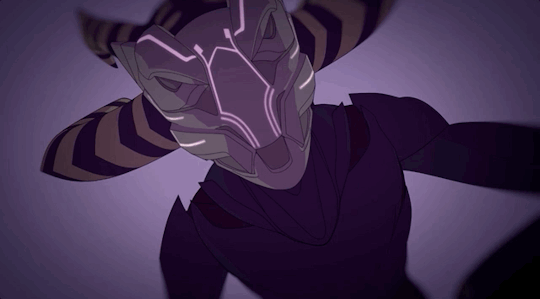
Jabberwalker: YES! READY! STARVING! TAKING!
So, this volume is just LRRH masked as Alice in Wonderland, as you can discover by reading this. Still, there is something missing from my previous post. Or at least, I came up with a theory, which imo complements it well.
In short, Ruby's story this volume centers around 3 Wolves:
Neo

She stalks Ruby around, tortures her and manipulates her into killing herself. She waits for her in a cottage (a pink palace) in the woods and hides behind her illusions, which exhibit mismatched eyes (the Wolf's eyes giving him away).
Even when it comes to her main allusion, Neo being a Wolf fits. Trivia is just the Roman name for Hecate and what's Hecate's sacred animal? The Dog:

Neo is associated to the Jabberwalkers (dark and wolf-like creatures) in the Ever After (the Underworld). In short, the Jabberwalkers are her dogs (wolfs) and she herself is a wolf (dog-like creature).
The Curious Cat
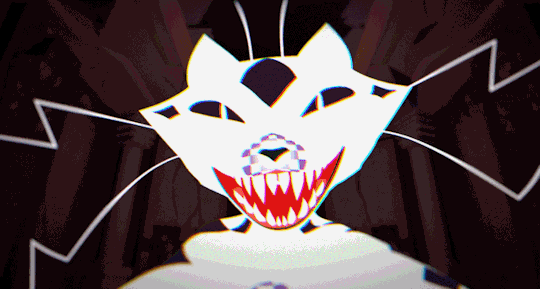
Do I need to explain? (I did in the previous meta anyway :P) They meet LRRH in the woods, trick her while she is wandering around with a basket full of flowers (WBY) and lead her around to make sure she gets completely lost.
Finally, when Ruby reaches the cottage in the woods, they surprise her and try to eat her. Only to end up swallowing up an older woman and the owner of the house. Even when it comes to them possessing Neo, the design calls back to the Big Bad Wolf of the story:
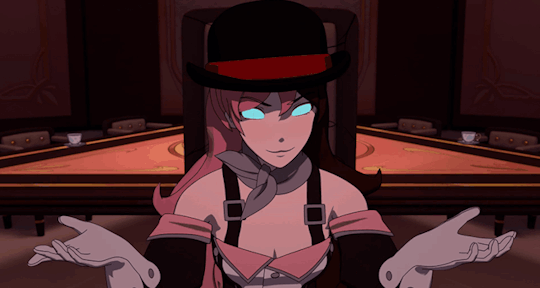
Both the eyes and the mouth are different than Neo's usual ones. Just like the Wolf in the fairy tale is described having peculiar eyes and a peculiar mouth. These 2 attributes are even tied to the Cat completely negating who Neo is. After all, Ice Cream girl is defined by:
her mismatched eyes, which her parents forced her to hide
her muteness, which her parents and teachers forced her to compensate with devices
Right now, Neo has lost both. Her mismatched eyes are hidden by the Cat's ones and her mouth speaks.
Ruby's inner Darkness
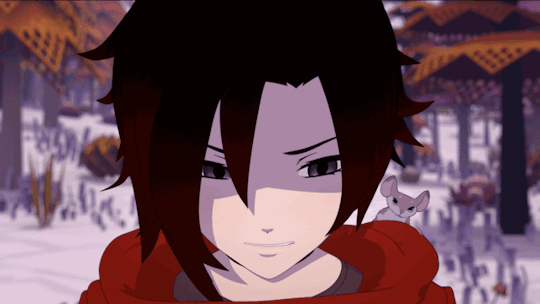
The Wolf in LRRH is symbolic of the Jungian Shadow aka everything a person represses. The thing with the Shadow is that the most you try to ignore it, the more dangerous and stronger it becomes. Ruby has been living as the embodyment of life, which means she has been neglecting to tend to her own shadows. To her own feelings. To her own pain.
The result is her spiraling and being engulfed by Darkness. Still, this Darkness has not yet a real representation within the story, which brings us to:

“Beware the Jabberwock, my son!
The jaws that bite, the claws that catch!
Beware the Jubjub bird, and shun
The frumious Bandersnatch!”
He took his vorpal sword in hand;
Long time the manxome foe he sought—
So rested he by the Tumtum tree
And stood awhile in thought.
Interesting, the original poem mentions a fight between the hero and the monster by the Tumtum tree :P
What does the Jabberwalker represent, though? This creature is the only one, who can kill the Afterans. Why? I think because they thematically represent a loss of self:
The Tree is going to transform Afterans according to what they are and to what they want to become. This can lead to progression, like the Paper Pleasers or to regression, like the Red King, who turns into a Prince. Still, what happens if the creature just... can't figure themself out? What does happen if they choose to give up on any new possible identity?
In this case, they would choose to become nobody. They would decide to give in to anonimity, which is the opposite of self-individualization. Anonimity is a trait of Grimms, which are empty and try to fill themselves by praying on human negativity. In short, anonimity can be seen as a declination of Destruction. So, what if when Afterans can't figure themselves out... they end up becoming a Jabberwalker? Or what if the Jabberwalker is a body that collects all the souls who could not properly ascend, neither to regress nor to progress? A body with no proper identity, which can only jabber very basic and instinctive concepts, with no real meaning behind them?
After all, they very clearly allude to zombies, as RWBY even start calling them Walkers. And what are zombies if not people who lost their sense of self? And what do zombies do if not to spread an infection, which in this case is Destruction? Death?
The Tree is the path to self-actualization, so a person symbolically dies when they lose their sense of self completely. When they don't wanna become anything else. Only in this case, they really disappear and become nothing. Only in this case their existance is negated and amounts to nothing.
Personally, I wouldn't be surprised if this is what awaits Ruby as she is now. She doesn't wanna change. She wants to disappear. It is possible, then, she will risk to be swallowed by the Jabberwalker. It is possible she might become the Jabberwalker herself. A mindless Wolf. Still, obvious foreshadowing is obvious:
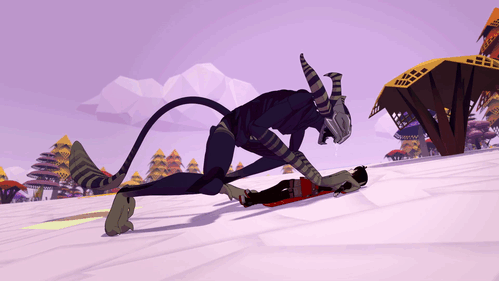
The moment Ruby is about to get killed by Neo's Jabberwalker, her whole team comes to her rescue. This is clearly what is going to happen here, as well.
At the same time, I think what should help Ruby conquers this is also something else:
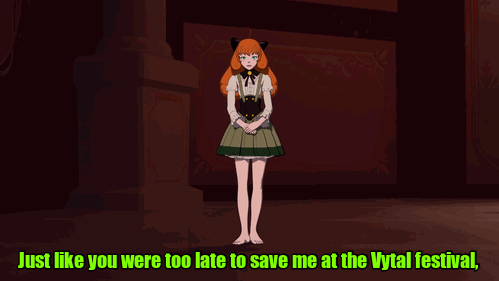
Penny's death has been eating at Ruby throughout the whole volume. It is the news of her loss, which starts Ruby's spiral and her friend keeps appearing everywhere in the Ever After and Ruby's mind. So, obviously she needs to come to terms with this. Ruby needs catharsis and right now I think @hamliet theory is right: only Jaune can give it to Ruby.
Right now, Ruby thinks Penny died by negating herself, by choosing to be nothing out of a death wish. Still, this isn't true. Penny died as herself. It is tragic, but she still managed to affirm her own personhood. She chooses friendship and trust over duty and control. Penny dies, but she doesn't become a "Jabberwalker". She isn't undone into nothing, but on the contrary she "ascends" into gold. Ruby needs to realize this. She needs to realize the kind of person Penny was. And she needs to realize what she herself is doing now is the opposite of how Penny lived and died.
I think such a realization might give Ruby catharsis and inspire her to move on. In general, it would work very well thematically on multiple levels and for multiple characters:
It means Penny symbolically saves Ruby, which would be just a beautiful conclusion to their bond. Ruby is the one who recognizes Penny's personhood first, so it makes sense for Penny to indirectly do the same for Ruby. She inspires her into becoming an idealistic adult.
It means symbolically Ruby's child self saves her. It is that purest and most idealistic part of herself that comes through for Ruby when she needs it.
It gives catharsis to Jaune, as well. It turns out what he was hiding out of pain and shame is the key to save Ruby.
It foreshadows what Jaune will probably have to do in the finale aka conveying to Cinder Pyrrha's teaching about destiny. He can start practicing with Ruby.
It completes the parallel between Jaune/Pyrrha and Ruby/Penny nicely. In volume 5 Jaune's suicidal charge is interrupted when he realizes this is not what Pyrrha did. Here Ruby should realize what she is doing is not what Penny did.
In general, it just works very well with the theme of grief explored this volume. Right now, Ruby has been going through the 5 stages of grief twice, in a neverending spiral:
Episode 1 > negation > Penny's death is hidden and Ruby refuses to talk about it
Episode 2 > bargaining > Ruby needs to bargain for Penny's sword and eventually she bargains the sword to meet the Red King and talks about her feelings for Penny by doing so
Episode 3 > anger > Ruby gets angry at the Red Prince and shouts at him in frustration
Episode 4 > depression > Ruby is undone by Herb's hallucinations
Episode 5 > acceptance > Ruby meets the Blacksmith and is confronted by Penny and Summer's ghosts, but fails to reach true acceptance
So she starts the cycle again
Episode 5 > bargaining > Ruby bargains Summer's emblem to help her friends and mentions "a mother's promise"
Episode 6 > negation > Ruby doesn't even see Summer Rose's reflection in the gallery of mirrors
Episode 7 > anger > Ruby lashes out at others
Episode 8 > depression > Ruby is overwhelmed by her pain and attempts suicide
I think episode 9 and 10 should be acceptance, true acceptance this time. I also think it would be cool if we have a call back to volume 6.
When Ruby uses her silver eyes there, the last 2 people she sees are Penny and then Summer:

Penny leads Ruby to Summer. I think here should be the same one way or the other. Acceptance over Penny should help Ruby face her feelings for Summer. After all, the majority of the narration in the trailer is still missing, which means we should get it in these final 2 episodes. Basically, Summer is coming, one way or the other.
BAD WOLF, GOOD WOLF
Ruby risking to become/to be swallowed by the Jabberwalker would work also for another reason:
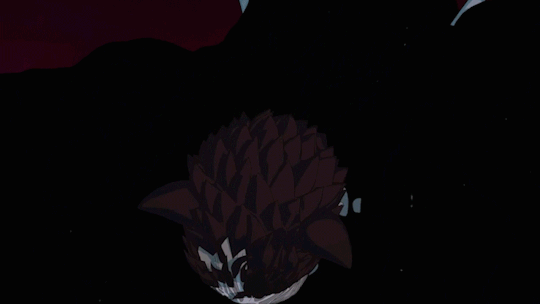
Turning Ruby into nothingness, forcing the light out of her to reduce her to a mindless puppet is probably what Salem wants to do. So, Ruby going through this same struggle now will give her the strength to face Salem and her Grimms Experiments when the time comes.
I think this whole volume has a meta-theme to it, which is how stories and fictions help people process trauma and grief. Both in healthy and unhealthy ways. I will write more about it when the season ends. As for now, let's say it is not by chance Ruby is going through her spiral in a fairy tale world, where she conveniently can't die. Imagine if Ruby had drunk poisoned tea on Remnant. She would have died for real. "Luckily" she only sips tree tea, which will be no fatal to her. The metaphorical meaning is clear, right? Ruby is symbolically rereading a fairy tale of he childhood. One her mom used to read ot her. She is rediscovering it from a more mature and darker perspective. She is processing through it all her pain, trauma and grief. Still, she will come out stronger from this. So stronger she will manage to face the challenges of the real world and to survive to them.
So, how is this transformation gonna manifest? Obviously Ruby is gonna come out as herself, once again. Still, if her inner transformation has to be shown, I would like for it to happen through Little:
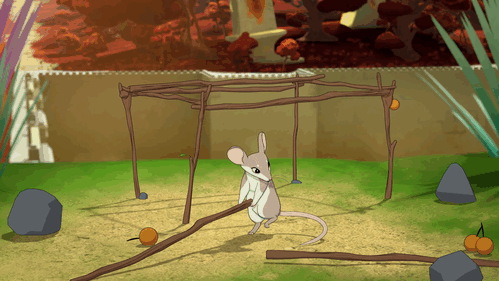
Mouse Leader: And on this day, we were not the prey, but the hunters!
The Mice Hunters tried to warn us and RWBY since the beginning. Beware of CATS! Still, they also claimed the prey is gonna be the hunter ;)
Now, this can become true in many different ways without Little having to change. Still, I like the idea of Little changing to metaphorically show Ruby's evolution. But if this is gonna happen, then which kind of form should they take?
Little is Ruby's child self, but also an animal-shaped companion. Basically, they represent an inner beast. It is just that at the beginning of the volume Ruby's inner beast is too immature because she is refusing to integrate with her shadow.
So, a more refined version of Little should maintain Little and Ruby's idealism, but also be wiser and show that Ruby has started to integrated with her repressed self. What better form than a Little Wolf, then?
After all:
The Hunter > The Huntress
Little Red Riding Hood > Ruby Rose
The Wolf? > Little
Ruby is unbalanced because she has refused her inner wolf all this time, so what better use can she make of it if not to change it into strength that protects her child self. To use all that repressed energy to refine herself, instead than negating who she is?
And on a light-hearted note... what is better than a wolf to hunt a Curious Cat?
(By the way, this can work well even in the case Neo stays in the Ever After with Juniper and Little. Juniper could be the March Hare to her Mad Hatter and Little might be the Dog to her Hecate) > thanks to @lintuwaterfall for suggesting this
#rwby#rwby spoilers#rwby volume 9#ruby rose#little#neopolitan#curious cat#once upon an allusion#jabberwalker#rwby meta#rwby theory#penny polendina#jaune arc#tw: penny's death#tw: suicide#rwby headcanon
85 notes
·
View notes
Photo
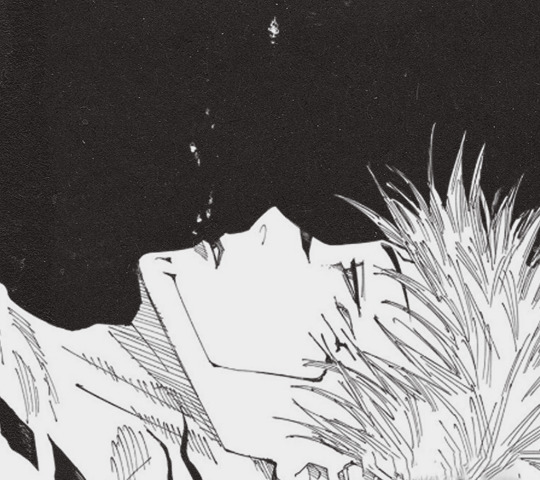
JUJUTSU KAISEN, CHAPTER 216 THOUGHTS.
Chapter 216: Bath reveals to us what exactly the “Bath” is and how Sukuna plans to use it to drag Megumi down further into the murky depths of his own conscious. This scene is soaked in Jungian symbolism, as Megumi’s control over the body (his consciousness) is superseded by Sukuna who take complete control of him. Sukuna and Megumi fighting over control of their own body greatly resembles Jung’s idea of the “Persona” and the “Shadow”, and is highly symbolic of Megumi’s personal arc as well. Which I will now detail under the cut.
1. Still Waters Run Deep
For a brief overview of Jung’s ideas, both Jung and Freud theorized the psyche (consciousness) was made up of three components. Freud’s iceberg theory of the unconscious likened the mind to an iceberg, as the most important part of the mind is what you cannot see.
Similiar to Freud, Jung divided the mind into three areas. While Freud named these unconscious, preconscious, and conscious, Jung divided the ego, the personal unconscious, and the collective unconscious.
Briefly, the Persona is the topmost layer of the psyche presented to the world
“A kind of mask, designed on one hand to make a definite impression on others, and on the other to conceal the true nature of the individual. (Jung, Two essays on Analytical Psychology).
WHhhle the persona is what one thinks as well as others think one is” the shadow is
“that hidden, repressed, for the most part inferior and guilt-kladen personality whos’s untimate ramification reach back into the realm of our animal acestors. (Collected works of C.G. Jung Volume 9)
Finally, the Collective unconscious the deepest layer of the mind sometimes referred to as the “objective psyche”, refers to the idea that a segment of the deepest unconscious mind is genetically inherited and common to all human beings. The collective unconscious is made up of knowledge, instincts, and imagery that every human is born with.
He posited because of this collective unconscious, there are recurring motifs and symbols he termed “archetypes” which appear in mythologies from different cultures around the world. This was his reason why two cultures who never had any contact with each other, could have myths with similiar stories. One of his greatest examples of this was the “flood myth” which recurs in many cultures, such as the biblical account and the flood in the epic of Gilgamesh.
This is where I tie it back to Jujutsu Kaisen and Sukuna’s “bath” because for Jung, water was the most common symbol of the unconscious.
“THe lake in the valley is the unconscious, which lies, as it were, underneath the consciousness, so that it is often referred to as the “subconscious”, usually with the perjorative connotation of an inferior consciousness.
Water is the “valley spirit”, the water dragon of Tao, whose nature resebles wayer - a yang embraced in the yin.
Psychologically, therefore, water means spirit that has become unconscious.
So the dream of the theologian is quite right in telling him that down by the water, he could experience the working of the living spirit like amiracle of healing in the pool of Bethesda.
The descent into the depths always seems to preced the ascent (Collected works of C.G. Jung Volume 9)
Above Jung references collective mythologies from different cultures to make his point, Taoism, the concept of Yin and Yang, and the pool of Bethesda from the New Testament where Jesus miraculously healed a paralyzed man. Rather than describe it as an inferior consciousness he likens it to the other half of the mind, the yang to the higher mind’s yin.
Obviously, Jujutsu Kaisen is making use of water symbolism as well, Sukuna is soaking Megumi to push him down deeper in his mind. This chapter is literally showing us Megumi’s “Descent into the depths.”
Shadows, and Water have always been a recurring symbolism for Megumi, though. Beginning with early on, Sukuna suggests to Megumi the real strength of the “Ten Shadows” technique is not the Shikigami he summons but the fact he uses his shadows as a medium.
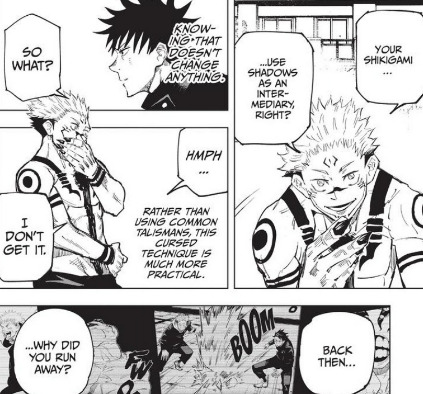
It becomes apparent early on Megumi has what is easily the greatest technique in his clan, and yet he doesn’t utilize it properly nor does he realize its full potential. Megumi’s strength comes from his shadows, but Megumi does not even seem to be aware of his full potential.
When Gojo suggests that a Zen’in Clan Ten Shadows user defeated a Six-Eyes user in the past Megumi denies the fact he could ever be stronger than Gojo. When Megumi remembers Gojo’s lecture on how quick he is to give up and sacrifice himself in a fight, rather than “swinging for the fences” look what his newly formed domain expansion resembles.
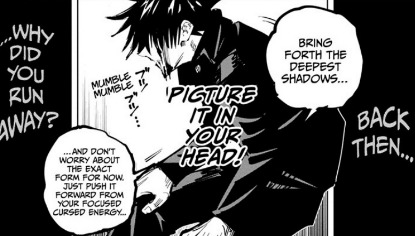

His domain expansion “brings forth the deepest shadows” and when he uses it, it looks and moves like water. Megumi’s greatest power comes in utilizing his shadow, and yet paradoxically he is Megumi is a highly repressed individual character who always ignores and looks away from his shadow.
"Still waters run deep” is a phrase often used to describe the Jungian Shadow. Megumi is so much more than what he appears on the surface, you step forward in the water expecting it to be shallow and then you sink down into an ocean. This is because Megumi’s most common tactic is to suppress and hide his true feelings about things in any kind of stressful situation rather than dealing with him.
However, his eyes that were as deep as the night that peeped out from the bottom of a deep ditch became even more lifeless.
Fushiguro tried once more to switch off his self-awareness.
Numbness was the safety feature of life. If he did not think of a way to protect his spirit, it would not be strange if a curse was born.
In a wy, what Sukuna is doing right now is an extreme form of what Megumi always does. Megumi feels very helpless and out of control of his own life. His parents abandoned him. He didn’t want to be a sorcerer but was forced into it by a situation out of his control. When he did decide to become a sorcerer to stop Tsumiki from going to the Zen’in, he couldn’t protect her and Tsumiki was attacked by a curse despite Megumi being someone whose job it is to exorcise curses he was completely useless in that scenario.

Part of the reason Megumi was tricked so easily into losing possession of his body to Sukuna, is because Megumi has so little regard for his health and well-being. Yuji warned him multiple times that Sukuna was planning something for him, but Megumi didn’t even think about the danger to himself if he kept Yuji close. Megumi is someone who actively refuses to take control of his own life, and therefore, Sukuna takes it away from him.
However, Sukuna’s attempts to take control of Megumi’s body may not have completely succeeded. Just like there is no yin without the yang, there is no persona without the shadow. A person’s mind isn’t one or the other, it’s both.
The shadow isn’t the “true self” it’s merely the hidden self. Persona matters in identity too. As Kurt Vonnegut said, “We are what we pretend to be.”
Sukuna immediately decides to target and kill Tsumiki’s body, because the bath did not work in completely submerging Megumi’s soul.
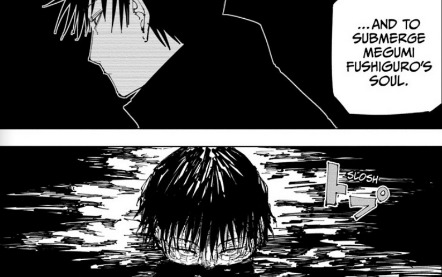
As stated above, the descent into the depths always seems to precede the ascent.
It’s revealed the same chapter that Megumi’s body was taken over, that Megumi always had the potential to be a vessel just like Yuji did, which is why Sukuna needed to break his mind first before he tried to take control because there was always a possibility that Megumi could take his body back and seal Sukuna within rather than giving up control.
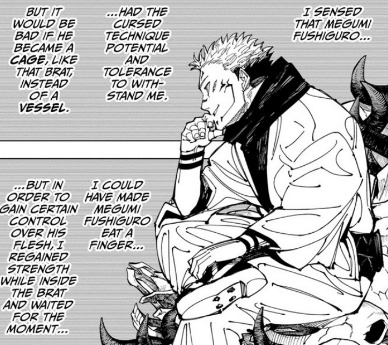
The descent into the depths always seems to precede the ascent, in a way this is what Megumi needs to do. It’s always what he’s needed. He needs to plumb the depths of his shadows, and then crawl out of those murky depths and back to the surface. Megumi needs to self-actualize and self-reflect as a human being rather than trying to keep everything in the dark because that’s the first step to taking control of his own life. Fighting back for control of his own body, is just Megumi facing his inner demons because he is literally fighting his inner demons in the form of Sukuna.
To further tie in this idea let me quote @theanimepsychologist
Also I know I sound like a broken record but Jacob’s Ladder is a HELL of a rabbit hole. It’s not just Urizen, it’s the implication of Jacob going through hell and then going up the ladder. Makes me wonder if Megumi will follow that since some of the current symbolism is totally about going into the unconscious where he’s having to face evil (Sukuna, the bath).
Remember, Jacob’s ladder is the technique that Hana / Angel tried to use to exorcise / reach Megumi and it seemed to be working until Sukuna tricked her.
If Sukuna manages to kill Yorozu / Tsumiki and that is a big if, I believe even Megumi can come back from that. Because Megumi has always tried living for the sake of others, doing things for Tsumiki or Yuji’s sake, when what he really needs to do is live for his own sake.
2. The Collective Unconscious
So, the Jungian symbolism associated with Sukuna baffled me for a long time. Originally, I thought Sukuna was supposed to be Yuji’s shadow because he lives deep within Yuji, he resembles him almost exactly (even Sukuna’s true four-armed form resembles him) he can take control of his body when Yuji’s willpower and consciousness wanes. However, when he switched bodies with Megumi in a way none of us saw coming that seemed to disprove that idea.
Then, was he supposed to be Megumi’s shadow all along? In the same way, Sukuna was only ever interested in Megumi and was always planning to take Megumi’s body from him, does that mean he was meant to reflect Megumi’s suppressed side?
However, after thinking about it I’ve come to a different conclusion. He’s not the shadow for Yuji, or Megumi, he’s both of their shadows. Rather, he represents the third part of the psyche buried deep within us, the collective unconscious.
The collective unconscious is shared by all of humanity, populated by instincts we are born with and contains the symbols that occur throughout all of mythology. Similarly, Sukuna himself is not only “Ryomen Sukuna” someone who is regarded as a myth in the story itself but turns out to be a real person. He’s also “the disgraced one” the enemy of “angel” a character who is clearly drawing from Jewish and Christian mythology. (The Jacob’s Ladder is from the Torah, whereas jewish and christian mythologies have wildly different ideas of satan, and “disgraced one” seems to have a resemblance to Milton’s depiction of Lucifer).

Which means Sukuna as a character draws symbols from both eastern and western mythologies. This is where Jung’s ideas also differ from Freud, he believed that people have a “collective unconscious” which influences them rather than just a “personal unconscious.”
Not only is Sukuna a sorcerer, he is “The Greatest Sorcerer”, he’s “The Honored One” (throw Buddhism into the mix with the polytheistic legend of who Ryomen Sukuna was). Sukuna was the peak of sorcery in the Heian era, and also the sorcerer all other sorcerers are compared to. A lot of the sorcerers of the past like Yorozu and Hajime agreed to the culling game, just for the chance of fighting Sukuna. Yuji even says “I almost forgot these guys are and will always be curses.”
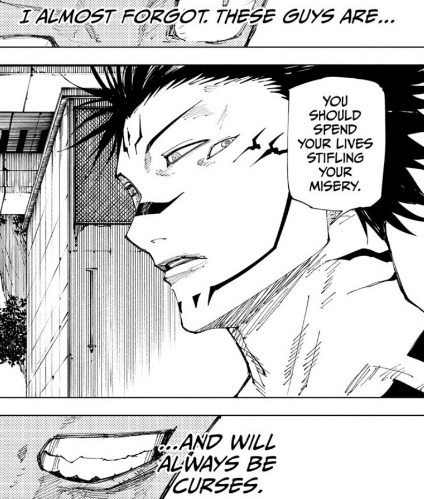
Curses come from the collective pent up negative feelings of humanity, they are human emotions given physical form, they are born from the collective unconscious and Sukuna is the truest example of a curse there is. He is also an advocate for people living as selfishly as possible. He is pure instinct. He has a giant mouth on his stomach. The one and only servant he tolerates is a chef who is good at cooking them food. He’s a walking appetite who consumes everything including human flesh. His technique is based on cooking. His inner domain is on top of a massive stretch of water.
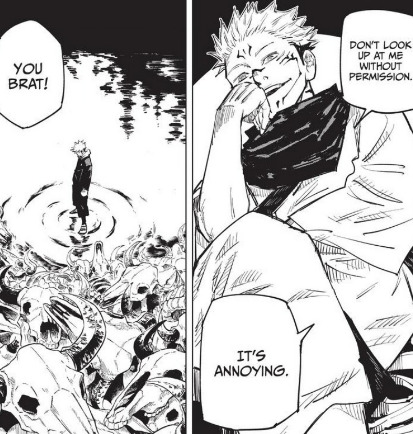
Sukuna isn’t just a product fo the ocean of the collective unconscious, he is the ocean.
My good friend @theanimepsychologist, the Jung to my Freud (this is a joke I don’t believe in Freud’s theories) also pointed out to me that
Psychologist: But at the same time it sort of fits with my own suspicions that sukuna is mara. he has his own agency but he exploits and corrupts because of the character's inner evil. we shall see
Spooky: What is Mara exactly??
Psychologist: Mara = Satan. something about Buddha sitting under the boddhi tree and when he's about to reach enlightenment, Mara is like "hey what's up dude, but you could have all of these amazing hedonistic pleasures if you hang out with me"
Sukuna is someone who encourages every character to turn their back on enlightenment and live more hedonistically like he does, he scolds Jogo for relying on others instead of just focusing on getting stronger by himself, he quite literally takes control of Yuji and Megumi’s bodies to do evil things (slaughtering people in Shibuya, and now his attempts to kill Tusmiki) and makes them feel physically guilty for allowing him to take their bodies.
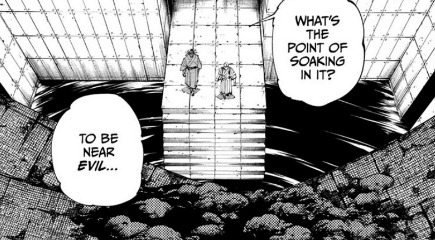
The whole purpose of the bath is to be near evil.
So, there you go my idea of what Sukuna is in Jungian Terms. He’s not the shadow of Megumi or Yuji, but the collective shadow of every sorcerer. By being the ideal of sorcerers. He’s not just based on the myth of Ryomen Sukuna, he’s a recurring myth in several different mythologies. He’s not human, he doesn’t want to be human, he’s like a living calamity, the truest curse there is.
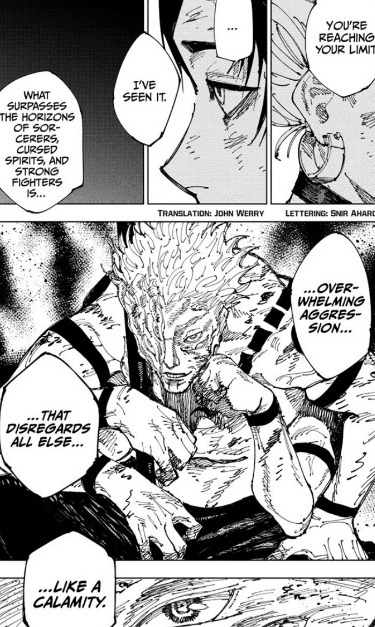
#jjk meta#ryomen sukuna#meguimi fushiguro#jjk spoilers#jujutsu kaisen spoilers#jujutsu kaisen#jujutsu kaisen theory#jujutsu kaisen aanylsis#sukuna#jujutsu kaisen meta
112 notes
·
View notes
Text
Elden Ring Starting Classes

Compiling the true history of the Lands Between cannot be done by using only information internal to the game world. It is not meant to be. When the meaning of the in-game dialogue and other text is ambiguous, players will fill in the blanks with their own biases - *and will not know that they are doing this*. Having the story be open to interpretation does not mean "all interpretations are equal", it means that it is very revealing the things that any given person may assume when solving an open ended question.
So that is partly how I had arrived at using the starting classes as way to organize the types of external information that can help understand the metaphysical nature of the Lands Between.
Hero - Nepheli Loux wears the Champion Set, which indirectly ties this starting class to Hoarah Loux. Consider how the step-by-step classic Hero's Journey would have applied to Hoarah Loux's conquest.
Warrior - There are several scattered items in the game connecting this class to the Blind Swordsman who sealed the God of Rot. Consider how the inconsistent description of this character resembles folklore. Ainsel, Chelona, and Eiglay are examples of direct references to folk tales and mythology, but there are many more parallels to be found.
Bandit - The bandit relies on crafting items such as arrows and efficiently using and countering status effects. They pay attention to the natural landscape. There are many animals and trees in the Lands Between that can be researched to learn more about their cultural significance and biology.
Prophet - Find the parallels to real world religious practices (pre-history, pagan, Christian, etc) and burial rites. View the Lands Between as an afterlife populated by gods and souls. Also consider that one of the ways to understand the history of the Lands Between is as a step-by-step process through the tarot major arcana (where many steps are reverse readings).
Confessor - Understand the secret goals of the Golden Order. Interpret the story told through classical alchemic elements, where the desired end result is gold and the rebis. Also consider Jungian psychology which is structured around persona, self, anima/animus, and shadow. And overall understand that alchemy is a fools errand and its failure is the reason for the Shattering.
Vagabond - The vagabond has the appearance of a classic knight and is an exile from another land. Approach the game as a Dark Souls veteran. Interpret symbolic elements in the context of past Dark Souls games - what is deliberately the same and what is different?
Samurai - Approach the game as a stranger in a strange land. Pay attention to exact words and phrasing - assume that there are no outright lies, but that some of the phrasing is deliberately misdirecting. Also pay attention to the words themselves - most names have meaningful interpretations if you look up the translation or definition. Assume that there is a story behind every proper noun. Also *Sekiro: Shadows Die Twice* literally takes place in Ashina the "Land of Reeds".
Astrologer - interpret the fate in the stars. Research the Real World Western Constellations and there are a lot of parallels between major players, enemy types, and animals in the story - with specific attention to the "fate of the Carian Royal Family". For a start *Three Sisters* is both a constellation and a name for the Greek Fates. Also study the history of astronomy from antiquity until the current understanding that the sun is a star.
Prisoner - The Prisoner uses Carian Sorcery which places the moon and stars as equal. Vedic Astrology. A form of astrology that determines a person's personality type according to the position of the moon among the 12 zodiac constellations at time of birth. The entire history of the Lands Between is approximately structured as following a wheel of astrological progression.
Wretch - The Wretch is mostly interpreted in the context of every other class. Overall, evokes the extreme difficulty of trying to brute force an understanding without using any external reference as framework.
There are also some observations that cross categories. There is language of colour in visuals of the various aspects of the game, including plant-life, clothing, status effects and item descriptions. Gemstones of various colours have real world associations with months of the year, the planets, and chakras. Architecture and statues have parallels to real world cultures. Understanding how the history of real world metallurgy and chemistry evolved from roots in alchemy is also helpful.
Anyways, that's just an overview of the external stuff that is relevant. There are a lot of elements to environmental storytelling that are also being overlooked.
#elden ring#elden ring lore#media analysis#I see a deconstruction and I try to put the pieces back together again#It would be a lot easier if more people understood what it means that everyone and everything is a different aspect of the same One Great#Soul = thought#Entire Lands Between is a land of thought and memory - it's a mindscape
11 notes
·
View notes
Text
Hi, I'm Scribe
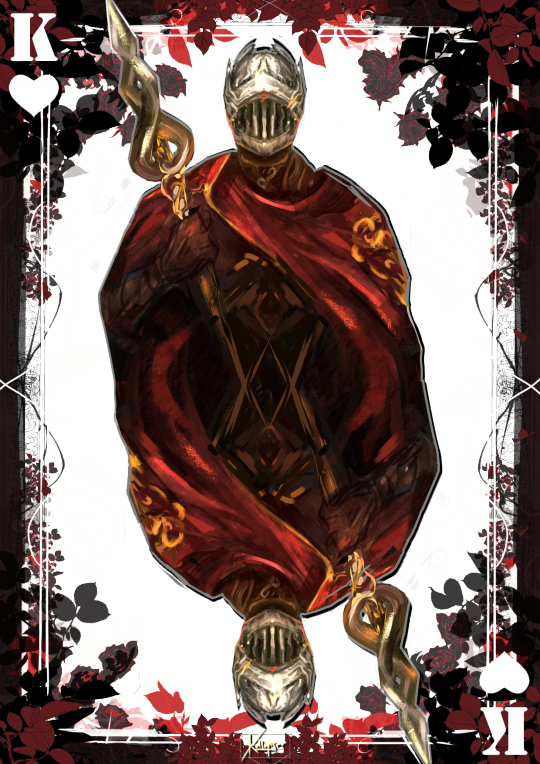
(Art by Kollapsar)
About:
As per the title you can call me Scribe; I also go by JL and or Knight (see Avatar) They/Them. I am a ex-professional Psychologist, I pretend to know things about Philosophy, and I have been known to write things that take place in my own silly little world. Also a TTRPG hobbyist that dreams about making my own one day.
I mainly write modern fantasy with horror elements from a first person perspective. Things tend to get existential and there is often not a difference between reality and metaphor. Also there is no shortage of queer folk with super powers or deep occult knowledge in my stories. Currently most of my work is in the form of short stories and flash fiction, with a novel/serial in the works here or there.
Intent:
What an ominous section title. Honestly I'm here to make friends in the writing community. I want to read other people's works and I want others to read my work. I want to encourage and be encouraged. I want to see the little notification number pop up on my screen and give my brain the good chemicals. Take this as blanket consent to tag me in games, to send me asks, and to send me messages. Tell me about your OCs and I'll gladly talk your ear off about world building.
I also intend on getting published one day. It would be lovely to meet others going through the process.
Lexical Earth:
Is the setting of most if not all of my writing. It's a modern fantasy setting who's hidden magic side was forcefully revealed during the year 2000, when the First Wave of Inscribed started showing up. Now governments are struggling to retain control, Thought Entities are going public with their machinations and hunger, and there is no small population of super heroes and villains trying to impose their views on reality.
The magic system of this setting is generally soft with harder rules the closer one is to the material world. The Realm of Spirit is swirling occult bullshit, but it takes someone with actual knowledge to pull it down into reality. Experiment with Jungian masks, personas, and shadows; see the connective tissue of stories stretch across cultures; and walk those paths. Alternatively write words on your Soul and bend reality to the whims of your Inscription.
Directory:
Bellow is a collection of the works I have posted and a short description of which each is about. Let me know if you would wish to be added to a general Lexical Earth tag list or if there is a specific series/protagonist you'd want to be tagged for.
(Under construction, there are a few works buried deep in my blog that I need to go excavate)
Samuel Smith, the Smith of Masks: Private investigator, grumpy and sarcastic, and part of the pre-inscribed world of Lexical. He's paid to solve issues between the Wyrd and the human; and often gets too emotionally invested.
1 – PI just wants to read books between jobs but Wyrd stuff is happening. Technically the first Lexical short I ever wrote.
2 – Sequel to the previous short. PI has a bad time working on this case, ends up having to sell part of his soul.
3 – Stand alone story. PI forgets what he's doing several times before solving a serial killer problem. Marian Wheeler would be proud.
Ken “Host of Fangs”, Lord of Hearts: Telepathic Inscribed that makes a hivemind with animals as his main power. He has substantial family and old life trauma and a masc., non-binary, partner who's soul is shaped like a jellyfish.
1 – Date gets interrupted by old woman/man Humanity handing out super powers.
2 – Ken gets a letter from his Ex and has big feelings about it.
Wander/er, Wanderer of Spirit: First Wave Inscribed that noped out of reality and went deep into the Realm of Spirit to learn about the Wyrd side of things. Generally an important person who shows up around big events, but more an advisor than a hero.
1 – Wanderer and a Thought Entity friend travel a bit too far away from earth. Careful not to wake Slumbering Kings.
Lexical Lore: For the World building and TTRPG side of Lexical.
1 – Inscribed, how do they work? How do you become one? Would they make a good RPG player character? All answered here. Go and make your own Inscribed and @ me with the results.
Lexical One-Offs: for stories that don't have a named protagonist or just aren't part of a series.
Bedroom – Someone wakes up and gets ready for work.
The Recursive Tree – The life cycle of one or more Thought Entities as seen from the perspective of a Soldier.
#writeblr#lexical earth#Scribe of Stories#Knight of Hearts#writeblr intro#writers on tumblr#It is done#It is rewriten#Perhaps now I can sleep#Dream of the waking world oh spirit of mine#Show me a reality I want to live in#and sleep oh waking world so that I might see it
24 notes
·
View notes
Text
in response to this post:
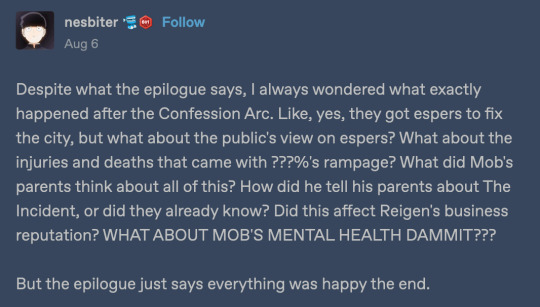
ONE-sensei is a bit of a troll, not gonna lie.
but... i actually like this ending, at least for comedy's sake. the stark juxtaposition of
'boy gets hit by a truck and his unexamined jungian shadow self flattens a city before he finally makes peace with it'
with
'and everything was just fine six months later'
is funnier than spelling out exactly how we get from point A to point B, because we KNOW — as the audience — that it wasn't 'just fine'. after everything we saw, how could it be?
subverted expectations underpin a lot of comedy, even dark comedy, especially absurdist comedy. MP100 is practically built on both. this story wrings a lot of humor out of sad, if not tragic, situations: witness shigeo's 'who told you you could pass out?!' after his home has been reduced to kindling. or ritsu's admission that he only recently stopped crying himself to sleep at night over his inability to bend spoons like his big brother. while he's letting shigeo know just how much he supposedly hates him in that alley.
not expanding upon the real-life consequences of said city-flattening is funny precisely because dropping 'i wrecked my hometown after nearly dying in a car accident on the way to ask out my crush when i was a teenager' in a conversation and just... leaving it there? would be fucking horrifying in real life. here, in the elastic magical-realist context of MP100, it's more darkly absurd than anything else...
more to your point, OP: in this particular series, ONE-sensei tells so much of this story by implication. the answers to some of your questions are in the text, only... alluded to.
this might get long. bear with me:
the fact that joseph from the government exists? and that he's an esper working in secret? implies that the knowledge of destructive espers might need to be concealed from the public at large, perhaps to prevent wide-scale panic or ostracism of espers themselves. i doubt the government was forthright with its citizens about the confession arc disaster or the actual cause, for the same reasons.
that suzuki's broadcast-hijacking world domination announcement is met with public disdain and ridicule, especially over social media? outside of our cast, no one actually takes his threat seriously until it happens. reigen's trash-talking claw's seventh division down to earth also shows how little respect espers who don't make themselves useful to society actually get here. he is, after all, just another member of the public.
that reigen agrees to take on haruaki amakusa as a client after the world domination arc in part because he's worried about losing business? people have begun to move away from seasoning city in the aftermath; whatever the threat amakusa's hyakki present, neutralizing them as soon as possible is best for reigen's continued financial health. i can see even more residents deciding they've had enough and leaving after shigeo's last brush with death. would you stay?
how many people know shigeo is connected to reigen, apart from the people they both know? out of his own inflated and fragile ego, reigen presents himself as a sole proprietor on his website; it doesn't seem his business or its reputation would be directly affected at all.
and the injuries caused? possible deaths? we get a taste: early on in chapter 100, several people are trapped and unable to move in a 地盤沈下 (jibánchinka, literally: 'land subsidence', which can apply to a sinkhole, a landslide...) shigeo has left in his wake. we only find out because a cop is being briefed on this and its cause while trying to detain the suspect for questioning.
but like all other bodily harm caused in this story, we aren't treated to the fallout. did the elderly ishiguro survive shou plowing him into the earth? did miyagawa die after teruki flipped his barrier onto him and broiled him in his own flames? did those high school bully boys live after shigeo cracked their heads open on the pavement like eggs? like, these are good questions. (i'm inclined to believe that all these people died, but many would call me harsh for saying that about an otherwise kind story. we never see them again, either way.)
shigeo actually has a healing factor of sorts; his jungian shadow self keeps plucking him from death's arms. we have no way of knowing if this is true for anyone else, because that isn't the story ONE wanted to tell. if nothing else, the mangaka's lack of desire to engage with this question of lethal consequences is at least consistent across MP100.
any questions that aren't answered either directly or that can't be answered by easy extrapolation can foster continued engagement with the material.
for example: we don't know what shigeo's parents think about much of anything in this story, besides how little they expect from him and how ritsu sets a standard they feel shigeo should live up to. this boy goes through hell multiple times and is never shown to confide in either of his parents about it, instead suffering in silence for some time until he finds someone he feels safe enough to talk to. all this gives me the distinct impression that shigeo just isn't that close to his mother or his father. i can understand why. it's actually kind of sad, even as readers' frustrated expectations of real-life parental involvement with — and confusion over — his and his brother's shenanigans also generate some dark humor.
this also establishes a precedent: since we never check in with them, by the time the confession arc rolls around, their opinion hardly matters. (but i'm sure someone has written a fic fleshing that out! i'm somewhat curious myself.)
#mob psycho#mob psycho 100#mp100#mp100 meta#shigeo kageyama#mp100 manga spoilers#confession arc#dramedy#magical realism#image description in alt#jungian shadow: the anime#ONE is a bit of a troll LOL#i like this ending though#you can fill in the blanks yourself#i feel like the absurdity of the entire situation is more apparent on the page#shigeo is an unreliable narrator#admittedly humor is subjective#one person's 'reducing the aftermath of a psychic catastrophe to a Noodle Incident is funny'#is another person's 'this is just lazy writing'#kageyama shigeo#分析
79 notes
·
View notes
Text
My own imagination of Persona 6
Although it is a bit early to say this, but after seeing the news of P5T and P3R, I decided to do some imagination.
First, consider the six elements of story theme, character growth direction, persona, enemy, adventure stage, and theme color to briefly analyze P3, P4, and P5.
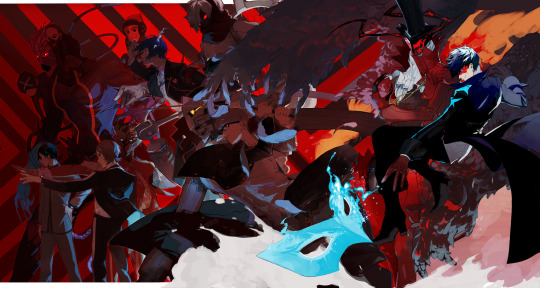
P3 is facing death, cherishing life, Greek mythology, Nyx, the artificial island (Tartarus), blue (cold).
P4 is the pursuit of truth, fetters, Japanese mythology, shadow selfs, the countryside (Midnight Channel), yellow (warm).
P5 is fighting against injustice, getting rid of shackles, resisters in literature and tricksters in mythology, worst adults, corrupt society (Palaces, Mementos), red (resistance).
Based on the above inference, I personally expect P6 to develop in the following stages.
P6 is global issues, human nature (self) and animal nature (id), dragons and power animals, hostile persona users, the international university (Ophion, Utopias and Lost World), green (life and vitality).
After thinking about the basic theme structure of P6, the next step is the basic story structure.
Before the birth of mankind, the Earth, known as the "Great Mother", produced the persona "Ophion". Its appearance is like the Earth of another world, which seems to confirm the Gaia hypothesis, and the Ophion is supported by The collective subconscious of prehistoric creatures has become and individually corresponds to the 22 "dragon veins" of the Tarot cards. These dragon veins have supported the balance of Ophion for hundreds of millions of years.
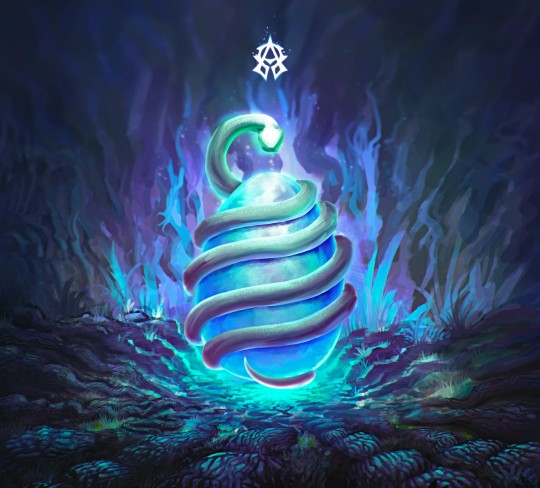
The protagonist is a girl who is closely related to the Velvet Room. Her mission is to make a contract with dragon veins to turn it into her personas. However, before dragon veins can become her personas, she must first enter her body and give birth to a "Cosmic Eggs" (that's why the protagonist is a girl this time, because boys can't give birth directly), the protagonist has to bear the responsibility of hatching the cosmic eggs.
The international university closely related to Ophion is the stage of our story. The elite students of this university established a "Utopia" in Ophion, and the uncultivated place is called the "Lost World". However, behind the seemingly utopian paradise but there is a huge conspiracy that threatens the entire Ophion. The protagonist that the player needs to control is to travel between Ophion and the university and find a way to fight the conspiracy. At the same time, the player will understand the mystery of the protagonist's life experience...
This is what I have in mind for now, and I will think about the characters later. The following references:
https://toroia.hatenadiary.jp/entry/20080122/1201015048 https://ionamiller2017.weebly.com/dragon-archetype.html https://dragondreaming-wordpress-com.translate.goog/ https://www.thesap.org.uk/articles-on-jungian-psychology-2/carl-gustav-jung/jungs-model-psyche/
7 notes
·
View notes
Note
What animal forms would you say sit at the intersection of the King and Magician Jungian Archetypes?
oh wonderful question! the king/ruler is a quintessential archetype: a member of the structural quadrant, the king seeks to enact their vision through asserting power and control in the world around them. they find security in maintaining a sense of control; often these individuals are either strong visionary leaders or corrupted by their authoritarian viewpoints. the magician is somewhat more enigmatic — as an impressionist, they also act as a catalyst for change, but when the magician is dominant and lacking structural influence they predominantly enact this through their intuition, reflection, and understanding. the crossroads of the ruler/magician paints the image of a wise leader, in tune with their own feelings and perspective, willing to seize leadership in order to bring betterment, but perhaps even more drawn into the trap of only seeing their own perspective.
for animal forms, apex predators are very fitting for the ruler and i think there's a nice selection of ones that evoke intuition, transformation, and polarized opinions as well. i'll touch on three here.

the jaguar
i used the jaguar as an example of a pullman daemon befitting the ruler in my post, but it's the perfect combination of the ruler and the magician. the jaguar is noble, courageous, and spiritual; in much mythology it is a symbol of leadership and wisdom through innovation. the jaguar exemplifies transformative leadership though also the withdrawn, intensely private nature a ruler/magician would possess.
there's boundless stories of the jaguar in mesoamerican cultures. the maya, for example, associated the jaguar with godliness, the underworld, and fertility. the popol vuh, which recounts the creation and history of the k'iche' maya people, features the hero twins: jaguar-spotted xbalanqué and his twin hunahpú. as another common example, the aztec similarly associated the jaguar with godliness (specifically tezcatlipoca, the smoking mirror, the creator god known to be both vengeful and a patron to the esteemed and wealthy) and strength — seen also through the ocēlōtl warriors. jaguars also are heavily associated with nagual: mesoamerican shapeshifters who have connected with power and spiritual insight, enabling them to take the form of their tonal animal. this is also quite smilar to the olmec spiritualism of the werejaguar, whose symbol is debated, but the anthropomorphism of the jaguar's portrayal seems similar to how the jaguar intersects with divinity and power in other mesoamerican cultures.
anyway all of this culminates to make the jaguar the perfect form for someone who resonates strongly with both the ruler and the magician. the jaguar certainly has other motifs as well; the jungle is of course a strong one, as well as mesoamerica, stalking and hunting, and the significance of their black morph (often called the black panther).

the bearded vulture
the bearded vulture is one of my favorite raptors and another beautiful intersection between the magician and the ruler. vultures in general i believe are wonderful candidates for the magician; scavenger animals excel in insight and transformation, often associated with themes of death and rebirth. the bearded vulture is a real striking example of this — its association with sovereignty comes primarily from iranian culture, known vernacularly as homa. homa is a legendary divine bird, believed to fly restlessly and never land, though when it casts a shadow or lands upon a man it is believed to bestow kingship. even the turbans of kings bore feathers from homa's plumage. homa also had connections with rebirth: similarly to a phoenix, it would be consumed in fire every few centuries, and then be reborn new from the ashes.
homa and the bearded vulture have strong positive associations in iranian culture, as it's also considered a bird of luck and lifelong happinness. it also has intensely false negative associations with taking livestock (the bearded vulture is also called the lammergeier, or lamb-taker in german), which unfortunately has contributed to its threatened status. in greece, the bearded vulture (or ossifrage) were one of the types of birds that ornithomancers could use to guide political decisions, again connecting bearded vultures to the spiritual and to kings.
altogether, the bearded vulture is a great option for someone who relates strongly to the transformative and rebirth aspects of the magician, as well as the destined and noble aspects of the ruler. the bearded vulture, in addition to elements mentioned above, also is associated with symbolism of the alps and highlands, death and decay, and sacred divinity. the bearded vulture is also a good option for a ruler/magician who also relates to aspects of the explorer.
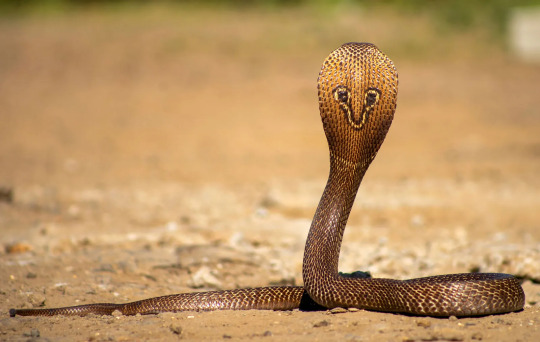
the cobra
the quintessential cobra is commonly confused with the king cobra — or maybe just overshadowed as the king cobra is largest and most venomous "cobra" while not being a cobra at all! it is an ophiophagus and not a naja like species such as the indian cobra and the egyptian cobra. cobras in general have complex associations of nobility, divinity, and fear. it's difficult to separate any snake form from its intrinsic negative associations, though the cobra is particularly rooted in most people's consciousness as being part of snake charming acts and notorious for deadly bites. i'm going to go over the cobra in general, though you could absolutely look into specific species that may fit you the best.
the ruler symbolism of the cobra has been seen both in how the cobra associates with the divine and with kings. the uraeus is one of the most striking cobra symbols: an upright or rearing cobra used in ancient egypt to denote kings. the cobra was intended to be a protector of the pharaoh and of tombs; it was also worn as a head ornament, conveying legitimacy of the ruler. this is due to the uraeus being a symbol of wadjet — the protector of lower egypt, depicted as a variant of a snake-woman (most often an egyptian cobra). gods of other cultures were also associated with the cobra. the hindu gods shiva and vishnu are often depicted with cobras, the latter seen resting atop the cobra shesha: a naga demigod and king of the serpents who holds the planets within his hood. despite the cobra's venomous reputation, it also holds an important place in cultural symbolism as the protector of spiritual and sacred spaces.
all in all, the cobra may be an excellent form for a ruler/magician who relates somewhat to elements of the outlaw. the cobra has a multifaceted reputation of both protective and deadly, kingly and feared, and featured in stories of both creation and destruction.
hope this helps in getting form ideas flowing! :)
19 notes
·
View notes
Text
A brief Knightfall masterpost
Also known as Arcfall, Arcfurnace, and other variations within the fandom. Knightfall is the one I like.
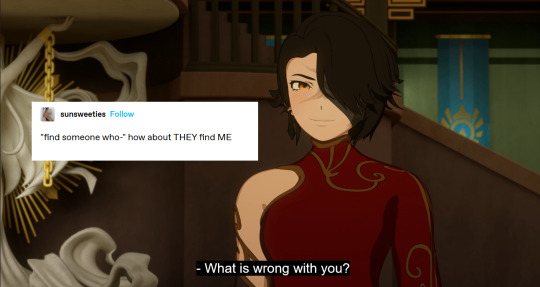
A quick and dirty collection of reasons the ship Cinder Fall/Jaune Arc is worth speculating about in canon, seriously.
This isn't meant to be comprehensive, rather a reference post I can use and something which might pique your curiosity for further reading. You can find more under my Knightfall tag. My real, lengthy Knightfall manifesto is a fic called The Distance Which Fools the Skimming Eye. Ha!!!!
This post also takes for granted that Cinder's redemption - and the redemption of the Maiden powers in tandem - will happen. I consider Knightfall and Cindemption interrelated. You can read more under my Cindemption tag.
I haven't used a read-more, since they're an inbuilt feature of Tumblr now, and otherwise unwieldy.
I'm going to summarise the main stuff I talk about with a paragraph for each section. I have tagged where applicable of whom I first heard about these points from. Unless otherwise denoted, it's my own analysis.
The background of Cinder and Cinderella, and Rhodopis
Rhodopis, considered a proto-form of the Cinderella fairytale type, was a figure written about by both Herodotus and Strabo. Strabo is the form you might be more familiar with, involving the sandal (analogous to the glass slipper) and her marriage to an Egyptian king. Herodotus treats her as a historical figure, and mentions that - during her second enslavement, under her second master - the brother of Sappho freed Rhodopis and fell in love with her. Jaune's sister, Sapphron (inspired by Sappho) features in V6, and Rhodopis means 'rose-faced' - Cinder is a key foil to Ruby as her Jungian Shadow. For that matter, Cinder is enslaved by Madame and then later Salem. Rhodes - though somewhat etymologically under debate - seems like an obvious nod to Rhodopis (who, for that matter, is simply found on the Wikipedia page for Cinderella). I believe that Cinder isn't necessarily only a bad ending Cinderella, but rather that disguised here is Rhodopis' story: two enslavements, and ultimate freedom. I also think we deserve a Prince Charming!Jaune, thank you very much. I first found out about Rhodopis through @iressent, whom I believe may have got it from @megashadowdragon, but I can't be certain.
The Indecisive King
A RWBY fairytale, it features a king struggling with the future shown to him with the Relic of Choice, and a widow who helps him overcome his struggles, and falls in love with him and marries him - they rule as king and queen side-by-side. There is now an animated version available. Cinder is consistently coded as a Queen, both her callsign and the fact she's a Maiden, and 'checkmates' Ironwood. As the Fall Maiden, her Relic is the Relic of Choice, and likely the last to be discovered. Jaune is a widower, in a sense, because of Pyrrha's death, though this is a bit more speculative, but still fitting (I should think). There are more details which line up between Jaune and Cinder and this story, which you can find under my Indecisive Queen tag. It is also fitting that of the five present in the Beacon Vault, the two surviving members are the ones to meet over the final Relic, in a rhyming scheme. @iressent was the first person to point out The Indecisive King to me, linking a post by @megashadowdragon once again.
Jaune and Joan of Arc
It's long been suspected by fandom that Cinder may be the one to kill Jaune, because of the historical circumstances of Joan of Arc's death. Given the pattern of inversions and Joan of Arc's character with Jaune - which is arguably darker than Joan's tonally - I think the pattern with Jaune might possibly be dark -> light, compared to Joan's which is light -> dark (burnt for her heresy). It doesn't seem likely he'll be martyred. So how do you realise the end of Joan of Arc, whilst maintaining that pattern, and playing with the intertextuality in a thematically meaningful way? (I don't view the intertextuality as being arbitrary, and it seems to have real meaning in the story derived from Salem and Ozma's 'first fairytale). I would argue he's still involved with Cinder, just not in the way you're expecting. If it's a lighter end, then I don't think it's death, I think he's involved in her redemption (helping a Fall Maiden) but potentially of a romantic nature (ardour). The consumption by flame is metaphorical, oh yes.
Salem and Ozma: Lovers to enemies -> enemies to lovers, human -> Grimm curse, Grimm curse -> human
With the fairytale background established, it's easy to talk about Salem and Ozma. All relationships in the show (even not endgame) to some degree reflect Salem and Ozma. Most prominently, Jaune and Cinder are - and could be - Salem and Ozma, in reverse. This would be symbolic (and in line with thematically) of salvific and redemptive themes in the story, and healing the first (and lasting) conflict. There is also intentional mirroring of Salem and Ozma scenes with Jaune and Cinder:

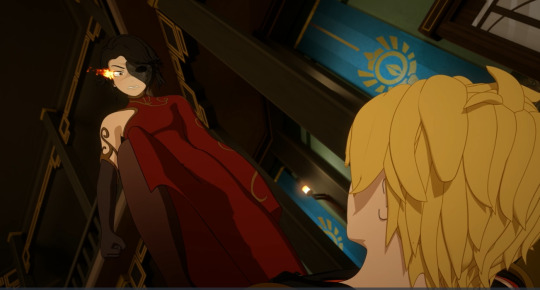
You can find more under my Reverse Ozlem tag, and the old one before I switched the formatting since it broke manual tag searching.
Ship paralleling
A common theme of relationships in the show is vulnerability, and the ways they answer (and refine) Ozlem. What I suspect to be the endgame pairings of RWBY all meet or reconcile across V4-5: Ren and Nora have their flashback in V4 (going to pains to keep this pattern); Ruby and Oscar meet for the first time in V5; Blake and Yang reconcile in V5; Jaune is searching for Cinder ("What about Cinder?") until they confront each other in V5. Special attention is paid to all of these, and given that we have virtual confirmation both Ren/Nora and Blake/Yang are canon, then it's reason to speculate about the others. One important thing to note is that this is when the cycle is renewing (Oscar's reincarnation) which eventually leads to the truth and discovery of who and what Salem and Oz really are. It's a necessary step. Breaking free from Ozma's reincarnation and Salem's deathlessness and immortality is a predominant theme, and is going to be reflected structurally in the story.
For that matter, visually (and even on a conversation level), both Ruby and Oscar's confrontation mirrors Jaune and Cinder's:
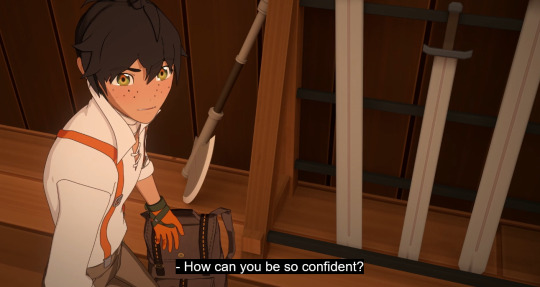
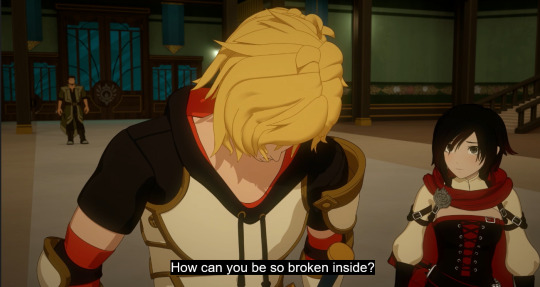
Lesser points: Jungian storytelling and RWBY
These may be less convincing to those unfamiliar with under-the-bonnet narrative structures. RWBY employs Jung in its storytelling (which is a common narrative device), and like with the ship patterning I just mentioned, Jaune and Cinder follow the others. As an example, Blake and Yang are respectively anima and animus to each other - a canon ship - and the path to Yang understanding Blake is by integrating her Shadow, her mother, Raven. The true is in reverse for Blake: Blake integrates her Shadow, Ilia - a literally type of story integration, since Ilia is redeemed - to understand that she doesn't have to run away from Yang anymore, and can confront her own actions. Jaune is Oscar's Shadow, and Cinder is Ruby's Shadow, but the true is in reverse: Oscar is Jaune's White Shadow, and Ruby is Cinder's White Shadow. So, integrating each other is a likely path to anima and animus integration. That Cinder will likely be purified by Ruby's eyes explains that second relationship. As a further note, Jaune's Semblance development in the presence of Cinder - because of Cinder - is a symbolic result of contact with the anima (spiritual evolution). The continent Anima is likely a nod to this as well.
Concluding remarks
There is a lot of intertextual motivation for speculating about Knightfall, and that's the purpose of this post. However, I personally find the dynamic of the Haven scene extremely interesting, and the consequences of V8 - Cinder situationally pressuring Jaune to mercy-kill Penny - which I find ripe for interest. You'll note that every ship has their own particular shared struggle across volumes:
V4-6: Ren and Nora (Ren's backstory); Blake and Yang (Blake leaving, Adam); Ruby and Oscar (Oscar questioning Ruby's motivations; Ruby discovering herself in V6); Jaune and Cinder (Pyrrha and the Fall of Beacon).
V7-V8 (and onwards): Ren and Nora (Mantle vs. Atlas; Nora's backstory); Blake and Yang (consequences of Adam; they're a bit more liquid, more like V6-V9 likely); Ruby and Oscar (whether to tell Ironwood the truth; splitting up vs. staying together); Jaune and Cinder (Penny).
I would also include Emerald and Mercury in this list (V8 most prominently with Emerald's defection and redemption and Mercury's recommital to Salem).
So, in some way, conflict is necessary to all of the ships, Jaune/Cinder is just accelerated. Given the ship paralleling in particular, Jaune/Cinder do reflect Blake/Yang in a very accelerated way (and Cinder is very much a Blake, and a Byronic heroine).
From a character motivation perspective, it also makes a great deal of sense, especially in terms of what I think is Jaune's ultimate narrative arc and the purpose of his Semblance. I don't think Ruby will purify Cinder of her Dark Curse alone, I think his Semblance is involved, and he's part of how she gets there. Cinder was failed by a Huntsman, and a unique and different Huntsman will help her lift herself up.
I just love irony: you will love a Fall Maiden, and you will help a Fall Maiden, just not the one you think. Cinder will be the Fall Maiden, just not in the way she expects: she'll be good. She'll learn from the lesson of the Four Maidens - like the other endgame Maidens (credit to @misstrashchan for noticing this pattern with Raven first) - and specifically that of the Fall Maiden, to look at what she's already got and what she could do with it.
I also think they would be riveting fun together.
Of course, the elephant in the room:
How can Jaune love Pyrrha's killer, Cinder? (Linked post about that)
Pyrrha’s death ties them together. It’s the thing that makes her his enemy, and it makes it personal. Pyrrha represents the Fall of Beacon, and the Fall of Beacon is really Cinder’s greatest villain architecture. Making Jaune her personal enemy because of that is extremely clever narratively, because it posits him as being the most important as opposed to Ruby, who really couldn’t give two shits about Cinder. Cinder’s afraid of Ruby, but in coming to terms with a challenge to her moral acts, it makes her focus on him… and spend the whole fight in V5 playing with him lol.
So what I’m trying to say is that Jaune is the one person who could help Cinder seek symbolic forgiveness… Pyrrha is the one act that can represent that. There’s another ask I’ve got to find where I talk about that.
I disagree with the idea Pyrrha and Penny make Knightfall impossible or inherently difficult: they are narrative points which make it possible.
By Jaune killing Penny (including the situational pressure from Cinder), he is in a position of narrative empathy with her.
Wasn't Jaune in love with Pyrrha?
Ultimately, I think most of the fandom recognises it's something Jaune's character has accepted and reconcile with (Pyrrha's death), and most other Jaune shippers don't bat an eyelid about it.
I think his upset over her death isn't from the fridged girlfriend angle, and if it had been, I think Jaune would've been a very different character. For that matter, their kiss was the Kiss of Death, not True Love's Kiss, and the first to set that pattern of broken magic. As above, I think it's more interesting if he's tied to Cinder by Pyrrha, just not in the way you'd expect. I think Pyrrha is a great character, but there's a misreading of her narrative purpose and priority.
What about Jaune/Weiss and Jaune/Ruby?
See here. They don't fit other ship patterns (if we take them seriously, and RWBY loves its patterning). I would allow that Jaune and Ruby's friendship is significant, though, and I personally prefer that reading (and I think the show does, too); very interestingly, I do think Jaune and Ruby's connection sets up Ruby/Oscar and Jaune/Cinder to some degree, given their Jungian relations and foiling.
You shouldn't reduce characters to romance!!!!
I'm sorry, I'm too chad to answer this, I can't hear you over the sound of good character writing and interconnected arcs.
Isn't Knightfall so unique? I love the idea of a redemption and a salvific romance, centred in an (ultimately hopeful, if at times bittersweet) fairytale about fairytales. It's not about fighting what you hate, but saving what you love.
#rwby knightfall#knightfall#arcfall#arcfurnace#jaune x cinder#cinder x jaune#all the names#but I'm firmly central with knightfall
97 notes
·
View notes
Text
i just finished narutaru (aka shadow star) and i can't stop thinking about it. it's so full of problems, especially the last few volumes, but i struggle to think of any anime/comic i've liked so much despite so many flaws.
spoilers abound, and this probably won't be interesting if you haven't read the manga, anyway.
from a creator standpoint, i'm paying attention to the fact that kitoh's use of duality and jungian archetypes seems to be what makes it so effective, although the former is part of what makes it so messy and needlessly convoluted. it seems like kitoh's goal was to present almost all characters in pairs with their opposite. the first and best example of this is shiina and akira, shiina being light/optimism/strength and akira being darkness/pessimism/weakness.
kitoh keeps on (and keeps on and keeps on) introducing new characters and it definitely gets tiresome when you're three volumes from the end and there's a new side character/side story, but one of the ways he makes them easier to digest and more integrated into the story is to immediately establish them as a reflection or contrast to another character. when hirono is reintroduced in vol. 6, we're following her struggle with bullying and her isolation is juxtaposed with akira's. it ends up being one of the most interesting and emotional conversations of the series, as a result, although i think hirono only has about three chapters of "screen time."
to make sure every character has a foil/opposite is one of the ways he makes each one seem to have more depth. tsurumaru being really enthusiastic about procreating is a bizarre and repugnant character trait, for example, but when he's juxtaposed with the hollow, uncaring, passionless naozumi, what he symbolizes seems more important and interesting.
you quickly see the problem with relying too much on the dualism approach, though. shiina and akira spend half the manga being clear and understandable opposites, for example, before akira's role is abruptly diminished and she's replaced at the end with kuri, who explains that she's the shadow to shiina's light. it would have been way more effective to nix the kuri character and have akira fill her role. i'm baffled as to why kitoh didn't do this, but i suspect when he started focusing the characters as playing symbolic dualistic roles, he was a bit blinded to simple ways to tighten dynamics and give them greater emotional impact.
stories that heavily employ jungian archetypes (shadow self, anima, great mother, etc.) and subconscious symbolism always seem to have this lingering grip on my psyche (the last ones that i remember feeling similarly about were the nightmare alley novel and overdue rewatch of evangelion). they still seem so mysterious and meaningful to me even when i can consciously recognize what the creator is doing. it makes me wonder just how sloppily you can use these devices and still have the same effect.
10 notes
·
View notes